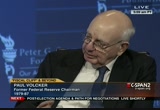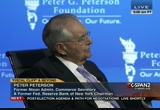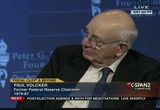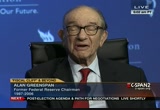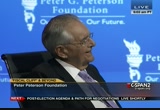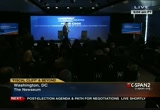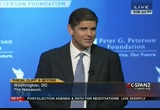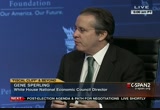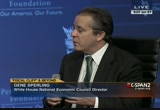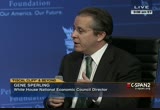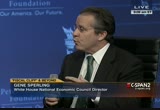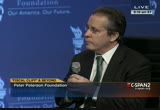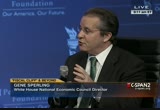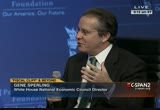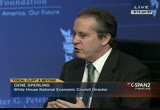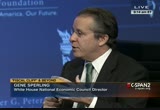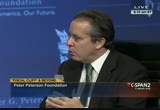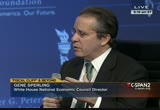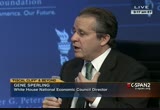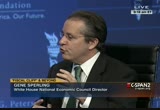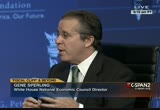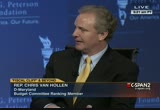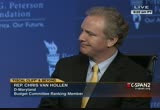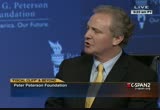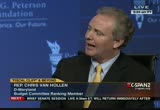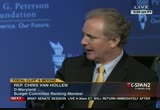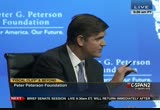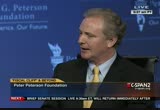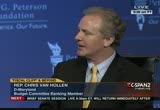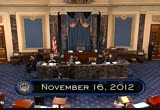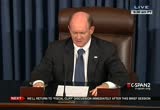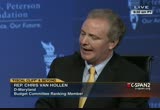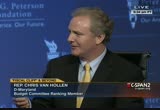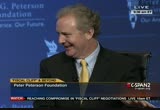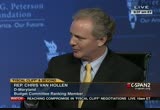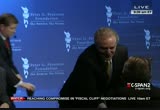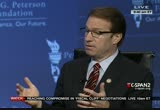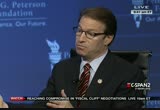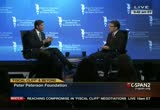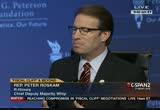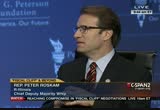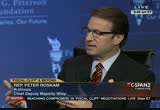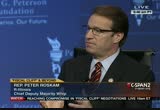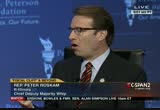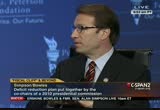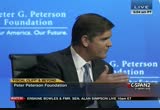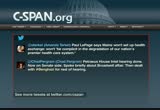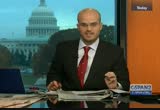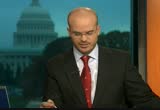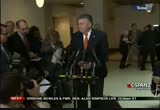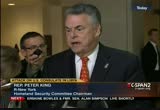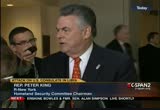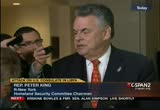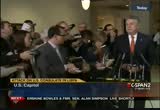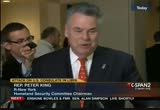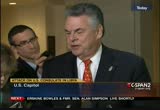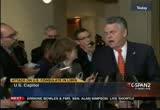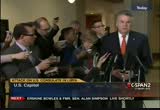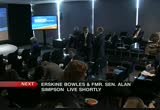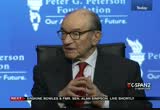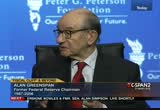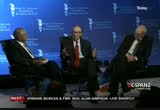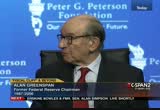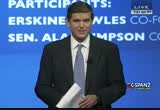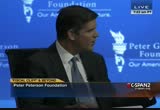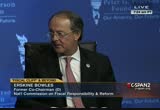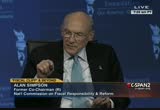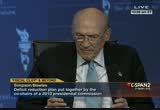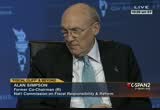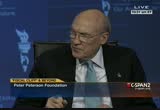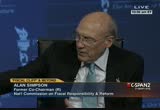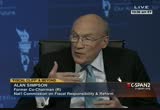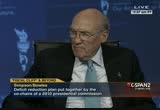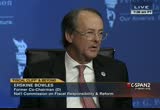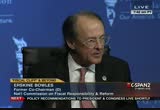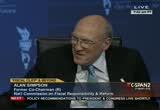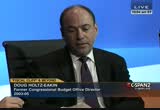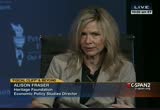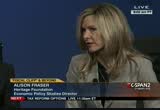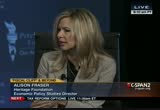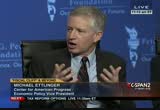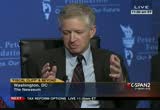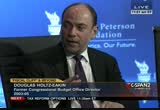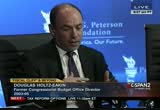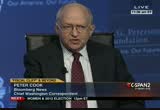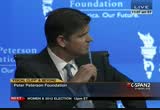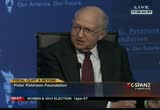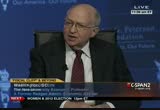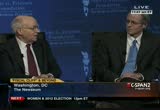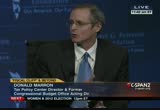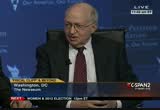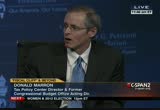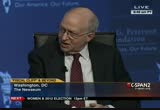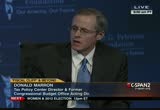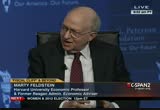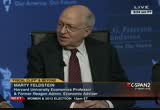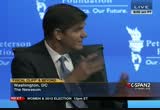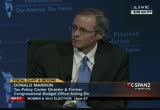tv U.S. Senate CSPAN November 16, 2012 9:00am-12:00pm EST
9:00 am
cheaply. partly because they're part of the eurozone and felt to provide the answers and david borrow at the same interest rates they were borrowing in germany which was a strong country. they borrowed and borrowed and borrowed, and they got in trouble. they are small country. the united states is a very big country but we have some of the same symptom, and we don't want to have the breakdown that they had in years when they reached the limits the market would take. i think the real lesson for us here is to fundamentals. >> just to wrap this up a little bit, i wanted to do to play god for a moment. >> playing? >> well, perhaps you're already at that state. we've outlined today's
9:01 am
challenges short-term, long-term and so forth. if the president were to call you into the oval office and say, okay, all things considered, what should i do? what would you have him do? >> i'd like paul to answer that one first. >> obviously going to make a deal in the short run, because what to do about this untenable situation of the sequester and the tax increases for everybody. so that got to work on a short-term deal, and then hard work on a pretty fundamental look at the tax system, and more or less at the same time you've got to look at certainly social security. certainly you've got to look at medicare, and what can you do that is convincing in terms of the other expenditures over a period of time. i think that's a very tough thing, but these are a consensus on the broad level of spending
9:02 am
that we're willing to pay for in taxes. and i'm afraid that that's more than 20%, which is what the historic relationship has been to gdp. but i don't know as it has to be much above that. that's the question. >> you, alan? >> well, everyone is saying the right things. i mean, both the white house and the congress, they have been saying the right thing for a long time, but nothing's happened. so i basically say to unless and until we are willing to forgo some of our privileges on both sides of the aisle, we can talk all, we can posture as much as we'd like, but it's not going to make any difference. we've got to act. let me say this. on september 14, i'm sorry, on a
9:03 am
program shortly after the simpson-bowles was announced, i was asked, i just barely understood, whether simpson-bowles would be usable by the congress. and i said that simpson-bowles is what will ultimately pass, and the only question is whether it is before or after the crisis. i still hold to that view. >> okay. i've raise a lot of questions. what should i have asked that he didn't? >> you are always, mr. chairman. >> strategic plan, is that what this conference is all about?
9:04 am
9:05 am
peter. >> i'm honored to peterson foundation has asked me to play a role in today's session. i was joking if i can't in the roosevelt room today, over at the white house listen to the principles themselves, the president speaker boehner talk about these issues, i would rather be here because this is where so much of the same conversation is going to be taking place, and i get the opportunity today to talk to many of those principles directly involved in those negotiations, what's going to play out of the next couple months. it's a critical time in the country's fiscal history right now, tough decisions to be made. and again, honored. glad somebody people are watching as well over the internet and elsewhere. so we are going to begin some additional conversations here right now. i'm going to be talking about with members of congress but also to erskine bowles and alan simpson there. will he talk with some top economist about some of the choices facing those policymakers, but right now we are joined by one of the principals in the conversation
9:06 am
to take place over at the white house in just about an hour or so, and that is gene sperling, the director of the national economic council. so i will invite him out there on the stage. so if gene sperling could join us. [applause] >> so, thanks it to you will time out before this big meeting at 10:15. appreciated. >> since pete peterson has always stood for bipartisan cooperation, he must have magically known to time today's meeting with what's happening at the white house today. >> share with our audience your view if you can't in how this is going to play a. will president obama walk in the room at 10:15 and put a plan on the table and suggest to speaker boehner this is my plan, take it or leave a? >> i don't think that's the spirit of compromise or cooperation that he will need to
9:07 am
reach the title bipartisan budget agreement that i think we all know the country needs. i think what you have seen is that the president has laid out both before the election and since pretty clear principles. and they are not inconsistent with many of the bipartisan commissions that have spoken on these issues. lots of the difference in the details but the general idea that you need a balanced approach, and i think balanced means at least a couple of things. mostly, that you have a large package that includes both revenues and entitlement savings, and that there's enough to help bring our debt down as a percentage of our economy and put it on a sustainable path. secondly, that is fair, that is progressive, thatcher asking those who can contribute the most -- that you are asking those who contribute the most, you can have shared sacrifice
9:08 am
and shared prosperity. and you are doing it in a way that is fair to the middle class and seniors and those are most vulnerable. there's another important part of the balance from which is that we reach that sweet spot in a 10 year plan, where he are both getting confidence that the debt is coming down as a percentage of our economy but also that you are giving momentum to the recovery right now when we still need more demand, more job creation. i think those are the type of principles that he is going to talk about. now, the issue that has been very clear on is that he does feel that as part of beating that kind of package, that the very first thing would be great for us to do as a country was come together and extend the middle-class tax cuts to extend the tax relief for all those under 250,000, or for income under 250,000. that would take an enormous amount of anxiety out of the
9:09 am
economy right now. it would deal with well over half of the fiscal cliff. they would show was working together, give greater certainty and demand to the consumer. and then he's also been very, very clear that he is not going to sign an extension of the bush tax cuts for income over 250,000 it and he does that really for three reasons, because there's three, unicom important principles that are important reading this -- reaching this agreement. one, you have enough revenue to be part of a plan that works and brings the deficit and debt down as a percentage of our economy. too, that you lock in the savings. you cannot move forward in this kind of significant budget agreement that's going to call for health reform, entitlement reform savings and less you have made clear that you also are going to lock in the revenue that is needed to get a budget agreement. and too often when people have talked about these arrangements,
9:10 am
the revenue component is more contingent. it's more based on speculative things that may or may not happen. i think you have to have a framework that locks in the savings. and then the third is that the president very much believes and has always said he believes that the revenue should be able to come from those over 250,000 as part of a plan that would call for spending cuts and entitlement savings that would be unquestionably broad-based. and so those are the overall principles. and i think as you said every single time he has spoken, he's not taking a my way or the highway approach. he's laying out his principles and he's been very clear he is always open to new ideas that are consistent with those broader principles. >> let's talk about we are there might be middleground, whether could be some movement because we sin john boehner and the president negotiate some of the same issues over the course of the last two years without success. what's different this time, in
9:11 am
the area taxes, the president said he won't accept an extension of the bush tax cuts for the wealthiest americans. could he accept something short of 39.6 for a topic for example, yet still have an increase over the 35% currently? >> i don't think, michael, at this point an hour before the meeting either add or subtract what the president said. but understand what's in the president's budget proposal right now, the president's current budget proposal raises 1.56 trillion as part of an overall package of over $4 trillion. in savings. it is true that about $950 billion of that come from not extending tax cuts in estate tax relief for those over 250,000. but it is another 500 billion that the president gets in this budget by limiting deductions, or excusing, limiting tax
9:12 am
expenditures or capping them at 28%. it's very interesting is that you hear this discussed everywhere, and you hear it discussed later today, what's often not mentioned is the one person was put forward a detailed proposal has for several years had been part of the budget. is president obama. so president obama reaches his goal, his revenue goal which is significant, it's probably, you know, it's probably still not as much as was in the initial simpson-bowles framework, so it's not excessive in any way but it is appropriate for reaching the type of $4 trillion package people are aspiring to, but he does that i both sides in those tax cuts for income over 250, and having a tax reform that was limited at 20%. now, i know that people must not have just seen that because with all the call for tax, high income tax expenditure reform, i
9:13 am
should be recalling all the applause and support we've gotten for this proposal. but that hasn't quite happened yet and, of course, that goes to the effect of israel difficult choices. and even at 28%, you know, there was a bit of resistance. i do think it shows that you, that the president not only is open to reform ideas, he's included a significant reform idea in his budget, which raises a half a trillion dollars over the next 10 years. >> i'm going ask you about the other tough choices because we're short on time already. entitlement programs. i know you're not going to negotiate here in front of us but if this president -- >> gee, i really was ready to but you're probably right. >> i will give you the opportunity. is this president prepared to move further when it comes to medicare come specifically, when he sits down with john boehner than he was back in the debt ceiling negotiations almost two years ago? >> well, you're right. i'm not going to start doing
9:14 am
that negotiation. what i would say is that the president, in his budget, put forward 360 billion in health savings. the president understands that health reform, entitlement reform is going to be part of this package. he's been very clear about that. and he's made that clear even to those supporters who might prefer to have zero or less medicare savings as part of an agreement. the president's focus has always been that when you are trying to reduce the degree that medicare contributes to the deficit, that the best way to do that is to look for things that lower overall health expenditures, as opposed to proposals that simply shift costs. they may lower the federal government spending, but only at the expense of increasing overall health care expanding -- spending in a private health
9:15 am
care and gaza. said he will be of course open to ideas and this issue. but it comes with a fundamental principle of the best thing for our, the best thing, both for our economy and for our budget, and for medicare recipients is to come up with solutions that lead to higher value, health care delivery, at a lower costs for the system as a whole, as opposed to cost shifting proposals. >> what would you say to anyone at the suggestion look at the fiscal cliff, the possibility again at these automatic spending cuts, and people who suggest listen, it's going to be painful, might lead to a possible recession but at the end of a it might be better for the country's long-term fiscal future. is there any notion within the white house that the fiscal cliff isn't that bad? >> no. no, i think that would be an economically irresponsible decision to take.
9:16 am
our goal is, the president's goal is to bring democrats and republicans together to do the kind of common ground agreement that will be good for our long, good for our economy in the short-term, help the recovery now, not hurt it, and help confidence in long-term investment in the united states by showing that, one, we can bring our debt down as a percentage of our economy, but also that we can end of the dysfunction over fiscal issues in washington, d.c. does would have a very positive impact on the short-term and long-term economy. i think to have a strategy that, to plot out a strategy to go over the fiscal cliff would be a responsible. would hurt millions and millions of middle-class families, tens and tens of millions he would see their taxes go up by two to
9:17 am
$3000. it would be very harmful for our economy, and i think more than just a technical contraction. one would do for conference, how much people would hold spending. so one can imagine very unfortunate scenarios where that situation is confronted, that it should be no one's goal. all of our goals should be to come together, and that's how the president looks at the. the president has rejected either the idea that your goal is to go over the cliff, or that your goal is to completely kick the can down the road. that would not help either. simply extending all of the deadlines we had would give people more sense that we'll never fix our long-term problems. so the president feels that the lame duck is a terrible thing to waste, that we need to come together very quickly. i think people should be somewhat comforted that we are nine or 10 days after the election, and you that the president of the united states speak strong on this issue several times. i think you have the speaker
9:18 am
make instructive comments and that they're already sitting down, today, just the friday after the election to start what we hope will be a constructive engagement that will lead to a solution. but not only prevents us from going over the fiscal cliff, but gives people confidence that we're going to take steps to energize and strengthen our recovery in the short term, and to surprise people by overcoming our dysfunction to do with our long-term fiscal challenges. >> surprise people. your level of confidence that you can share with this audience and folks watching at home, at the end of these conversations are not necessary today, at the end of these conversations there's going to be deal that puts the country on the fiscal flightpath to sustainability? >> as i think the president said, the furry first thing we could do to provide that confidence would be for the republicans and democrats to come together and say, before we even start negotiating the rest of the difficult choices, let's
9:19 am
just put into place the thing we all agree on, that we do not believe anyone's taxes under 250,000 should go up because we're not extending the bush taxes. so the president has made clear, let's start by extending the bush tax cuts for income under 250,000, given 98% of taxpayers, consumers the confidence that they're not going to face a tax increase next year. that would be very positive for the economy. it would be positive in getting confidence that we could work together, and i think it would build greater confidence that we will work out the rest of our difficult issues. but secondly i guess i would just say it this way. there is no reason for us not to work out an agreement. the president, yes, has been firm, that he will not extend the bush tax cuts for those making, for income over 250,000, but he's also been very clear
9:20 am
that he wants a balanced deal, that he understands there's got to be entitlement savings and health savings that are part of the package. he's been very clear about that, and he has said it every time that he is spoken that open to new ideas, that this is never going to be his way or the highway. and that, unicom he understands that, as i think you said many times, compromise cannot be a dirty word if you want to move our country forward in a period of divided government. >> gene sperling, you have another important meeting over at 1600 pennsylvania avenue with speaker boehner. we wish the both of you good luck in your negotiations. thank you for joining this conversation, and if we could have a round of applause here for gene sperling. as he heads off to a difficult job. [applause] >> and with that, gene will head off and again tried to run the country a little bit. we will invite congressman chris van hollen, the democrat are melted join us as we continue
9:21 am
this conversation. and i think the congressman easier. but for those of you who don't know of course, chris van hollen, the democrat from maryland is a top democrat on the budget committee, the house budget committee to keep in a critical point in these negotiations as well. as part of the supercommittee and someone who certainly has been a critical component to these conversations, and congressman, if you could join us. he's also a local guy. we always appreciate that here in washington. good to see you. thanks for joining us. i do know how much you heard of gene sperling, but what was the message you gave to him, what's the house democrat message to the administration as they go into these conversations because i did catch a lot of speak to you say play hardball? >> i did not. but what i said was i thought he laid it out well. in fact, gene and i are very much on the same page on these issues. with the president. so look, the challenge is pretty clear. number one, we've got to focus on accelerating the economy and
9:22 am
job growth. that means avoiding the fiscal cliff. it means extending for middle income taxpayers. we should not to talk about the payroll tax component of that which is a significant part of the fiscal cliff that is not really been a part of the conversation to i personally believe we should look at a one year extension, either that or some other mechanism that delivers the same economic benefit. >> $95 billion the price tag, at least it was with apache. is that something the country can afford? >> the goal is twofold. the goal is to make sure we do nothing to harm a fragile economic recovery because that action would be the worst thing from the deficit perspective in the short term, and then to login absolutely a long-term path to credible stable deficit reduction. we are trying to accomplish two things at once and make sure that we don't do anything in the short term to place a drag on economy. we should be taking measures to
9:23 am
try to boost a fragile economy. >> how much latitude as the president have right now to go in there in terms of these negotiations? he's getting pressure from democrats pick a server getting pressure pressure from republicans, within the democratic party, within the congressional leadership, does he have a free hand to talk about painful things, difficult things like, for example, scaling back medicare in certain ways to get, generate savings? >> first of all, the president i think has the confidence of the democratic caucus in the house and senate. that doesn't mean there's a blank check. everyone is going to want to make sure the represent their constituents in the best way. but i think there's a consensus that the president has laid out the challenge, clearly, and the president has also pointed out that the approach that he is taken in his budget, and she mentioned the president's budget proposal, was not some secret during the campaign. the president was the one person who is transparent about how he
9:24 am
would approach these issues and laid out a very clear revenue plan both in terms of allowing to opera for high income individuals to return to clinton era levels, and as gene said, he actually had a taxi from component that actually lowered the value of deduction. frankly, a pretty clean way by dropping the value of deduction from 35% to 28%. so he's actually put a plan on the table. we've never heard a plan from our republican colleagues. we heard a good tone from speaker boehner, but we haven't really seen any particular plan. with respect to the other issues, the approach we believe we should take to health care and medicare is to contain costs in the overall health care system. the reality is that the per capita increase in costs and the private health care system has actually run slightly higher than in the medicare system. so simply transferring costs
9:25 am
onto individuals does not address the fundamental problem. building on the kind of reforms we took in the affordable care act, which is to move away from a strict fee-for-service system in medicare is the better way to go. >> let me run a couple ideas that you that a been floating around the hill that i couldn't necessary get gene to bite on the target but we'll see if maybe you will. raising that trigger in terms of, the trigger for higher taxes, for those earning $1 million a year, maybe $500,000 a year, what do you think about that idea as a means to try to win more republican support to find middle ground and held up late in the house democratic caucus? >> look, i think people will consider various options. however, the fundamental issue is, as we said at the beginning, make sure we boost job growth but also make sure we put us on the path to long-term sustainable deficit reduction. so the issue is, what is the
9:26 am
revenue to cut next. if you look at the simpson-bowles plan, for example, if you look at the overall framework and you look at the revenue component of how they get to the deficit reduction numbers, the reality is the simpson-bowles revenue is more than what the president has put on the table, even the president $1.6 trillion. wedgwood is important is everyone recognized that. if our goal is deficit reduction, which it should be, in the long-term goal, and what we got to decide up front is how we can get the revenue and how are we going to get the cuts. so the issue with going to a million dollars threshold is that means less revenue coming in over the next 10 years to try and hit that target. so where you are you going to make up that revenue? you'll have to find somewhere else, if you going to take that balanced approach to long-term deficit reduction speak 1.6 trillion the target in terms of revenue. is that a target that you think
9:27 am
is the right target in terms of the revenue next? >> id. i think that is the right target. again, emphasize the fact that the simpson-bowles framework, and it didn't have a good framework in the sense that i think it got the right ratio of cuts to revenue, recognizing that their revenue estimate included, india starting point, in the foundation and the amount of revenue you would receive if the rate on top earners went back to clinton era levels but it's really important people understand that that was the starting point for the simpson-bowles calculation. that's why they get the deficit reduction numbers that they do. if you actually were to take out that assumption, they are about a trillion dollars short on their own deficit target. so it's a very important piece of their plan, and the president's proposal actually comes in a little bit less on revenue. than simpson-bowles. so look, i think 1.6 trillion is
9:28 am
a good target, although less than simpson-bowles, but i think if you look at his overall plan, the president has that right balance spent there's been some democrats have suggested maybe your leverage position would be enhanced if we went over the cliff. what do you think of that? >> well, i don't think we want to go over the cliff. we are trying to avoid going over the cliff. the real issue is whether our republican colleagues are willing to make those tough decisions before january 1, or whether they will only face those decisions after january 1. the president has laid out a very clear plan, not just since the election, but before the election or how to get there. so when i say that speaker boehner has set the right tone, but the jury is still out on the substance of his proposal, let's see the substance. the president has been transparent to let's see what the speakers proposing that
9:29 am
because if it doesn't hit those targets, and then were not going to be able to accomplish our goal of long-term deficit reduction with an appropriate revenue component. and it would be really bad if we just kicked the can down the road here, again. so between what happens in the next six weeks and what happens over the following six months in any structured way, we have to lock in some assurances that we're going to accomplish those dual goals of job growth and a sustainable credible path of long-term deficit reduction. >> what roles are markets thing in this conversation of? we saw what's happened in the market. there's some investors out there, maybe it's not all entirely tied to the fiscal cliff -- >> the u.s. senate is about to meet for a brief pro forma session. we will return to this discussion on the fiscal cliff after that. this is a pro forma session of
9:30 am
the senate. no legislative business is plan. most senators have gone on the thanksgiving holiday break. they are meeting every three days during this break in a pro forma session. the house is in session. legislative work wrapping up today, working on a bill to normalize trade relations with russia. this is live senate coverage on c-span2. the presiding officer: the senate will come to order. the clerk will read a communication to the senate. the clerk: washington, d.c., november 16, 2012. to the senate: under the provisions of rule 1, paragraph 3, of the standing rules of the senate, i hereby appoint the honorable christopher a. coons, a senator from the state of delaware, to perform the duties of the chair. signed: daniel k. inouye, president pro tempore. the presiding officer: under the previous order, the senate stands adjourned until 12:00 p.m. on tuesday, november 20,
9:31 am
2012. adjourn: >> the senate meets next tuesday at an eastern but it will be another pro forma session during the thanksgiving holiday break. senators return for legislative work after the holiday, monday november 26 if they were resumed consideration of the sportsman's bill expanding hunting and fishing on federal land it will take you back to the peterson foundation forum on what's called the fiscal cliff. members of congress are discussing the path forward on the negotiations. >> if you go over the fiscal cliff you also get another roughly $600 billion in savings from the pentagon, military spending. what is your own view about whether or not this country and
9:32 am
its government should be prepared to go beyond the 487 billion the president initially targeted in terms of reductions in defense spending and go further, something closer to that 600 billion figure? >> well, i do think there are additional savings to be made in defense spending. as you indicated we did $487 billion in reductions as part of the original budget control act, and it's important to be clear that those reductions were reduction from projected increase. it wasn't a reduction from the baseline. if you go off the fiscal cliff, it's about another $500 billion. simpson-bowles, essential had as much savings and defense as if he went over the fiscal cliff. they have another 500 billion simpson-bowles what's also important to them so that was part of the simpson-bowles framework. first of all, this of course is just in a responsible way to deal with cuts, whether defense or nondefense because it gets across the court -- board a bus
9:33 am
at. in terms of 92, i think $500 billion cut over 10 years is excessive. however, i do think there are additional savings to be made in defense. senator levin, the chairman senate armed service committee said -- of the bus at how you could do a little bit more. a key is, we should not have the budget decisions driving these decisions exclusively, or that should not be the main component. the main issue, what's our military strategy. and the reality is we're doing lots of things in the military that are still looking towards the cold war strategy. we need to focus on what our strategy is for this century and align our resources that way. >> you played paul ryan during the vice presidential debate. you know the paul ryan budget plan almost as well as paul ryan. i don't want to go too far. i know you know it well. what can you say about that
9:34 am
plan, knowing you were critical of the, you post a pic what you see in a plan that could be the basis for middleground, even between yourself and paul ryan moving forward? he's going to be part of these negotiations. you will be part of these negotiations. is there anything in that plan that you think could be deceived for some sort of compromise? any areas that you'd be willing to sit down and negotiate with republicans? >> there's very little overlap between the democratic budget and house republican budget. there are some areas of common ground. for example, we all believe that there are savings to be made in terms are going back many of the excessive agricultural subsidies. that's part of his budget, part of ours, get rid of some of these direct payments. we should be able to agree on those issues. fairly quickly. and there are some other items, but you raised a very interesting point, and is what i want to emphasize, which is the term common ground is used a lot. what we need here is not to be
9:35 am
great to find more common ground, but compromises also going to be required. compromise means not just identify areas everybody agrees on. compromise means you have to accept some things you don't like and exchange for moving forward and a publishing and national objective. and compromise has been in short supply in many parts of capitol hill. and so hopefully this action forcing it will allow us to move forward. but it needs to move forward in the context as gene indicated of an understanding that these issues were central to the campaign. vice presidential campaign, that there's some issues that were on the sidelines. this was not one of them in the debates, fiscal issues and budget issues, tax policy issues were all debated spent the president has a mandate in your view?
9:36 am
>> on the set of issues there is no doubt that when it comes to asking higher income individuals to contribute more to deficit reduction so we don't have to lock the other parts of the budget as hard as you otherwise would, that he has a mandate. and it's not only that he was elected, he also see all the exit polls that indicate a majority of americans support that idea. a majority. you've got at least 50% of voters who believe we should ask our individual -- higher income individuals to have more. that's an exit polls. so again, it's important to understand that i think everybody, one that everybody, the president, myself, others believe that a balanced approach that's been laid out both in simpson-bowles, rivlin diminish end of the bipartisan groups provides the correct framework for approaching this problem. others have entirely rejected
9:37 am
that framework or any, they have said that simpson-bowles ram work is not the way to go because of the revenue piece of it. >> quickly, we're out of time but do you sense something different this time around the you are on the supercomputer also your frustration when there was no deal coming out of that. is there something tangibly different now, do you think? >> well, there are two things that are different i think. one is, and i don't think it's a secret because a lot of them made his point in the state and the there's a lot of folks in congress on the republican side who were focused leading up to the election simply trying to defeat the president, and it is difficult to get any kind of cooperation. so the president has been reelected, term limited. hopefully that will be an objective. i put less stock in that that into the structure of the situation. because while the fiscal cliff contains potential risks, and also is an action forcing event
9:38 am
that creates opportunity. it's a very combustible mix of issues, and you know, what we don't want is for to all blogger interface. but it also presents an opportunity and you know, the president has laid out the challenge on the revenue side by and i think it's important that people listen carefully to what he said. because we do want to avoid going over the fiscal cliff. but what he has said is that he will insist, as he stated threat the campaign, that higher income individuals contribute more toward reducing the deficit. and it's, you know, let's think about if we were to go into january, january 1st, jenny was second and all these things we set. and the president goes on national television every day and says, you know, to the american people, i'm trying to provide tax relief to 98% of the american people. in fact, 100%, 100% of the
9:39 am
american people will get tax relief under first $250,000 of income, but our republican colleagues are saying now, nobody gets any tax relief and less higher income individuals get a bonus tax break on the income above $250,000. because that is the position they would be taken. and i just ask you, i think that is the wrong policy but i think it's politically unsustainable. and so i really hope our republican colleagues will recognize that that's unsustainable between now and end of this year, and not put that proposition to the test, starting january 1 of next year. >> the good news is with one of the republican colleagues waiting in the wings to talk about some of these very same issue. so chris van hollen, thanks for joining us. >> thank you. >> good to see. best of luck to you in your negotiations to come. with that we do want to invite
9:40 am
congressman peter roskam, a member of the republican leadership, the chief deputy, from illinois. congressman, good to see. hope you had a chance to hear what your colleague had to say, at least some of it. >> yeah, sure. >> also a member of the ways and means committee, certain element state senate with president obama, so you have a history there as well. first of all let me get you to respond to what you heard from chris van hollen, particularly on issues of taxes and this notion of ad hominem republicans should be prepared to extend the bush tax cuts for those earning less than $250,000 a year. >> well, i think there's ambiguity on the democratic side of the aisle, and then there's something that chris didn't say and that we haven't heard from the president's of ambiguity is who is rich? there's 250 description, 500, a million, a great deal of ambiguity. there's not been a clear discussion on impact of the past through entities for example, to
9:41 am
i represent suburban chicago and many other folks across both sides of the aisle, represent entities that are organized as pastors, and very little discussion beyond sort of the bumper sticker rhetoric on the impact on pastors as relates to these high rates. the second thing is, did you notice really what we haven't heard from the white house? what we haven't heard from the white house is really of much of the discussion on the other component that is, where are the spending cuts? where are the savings the president has been litigating the tax question and there's been a lot of discussion about that, and it should be, but has made any discussion substantively since the election about where the cuts are. now remember, the president described a balanced approach as a one to three revenue to cut ratio. we've largely been having the conversation on the revenue side. good conversation to have, let's have it, but there's been really
9:42 am
now offering on the part of where these cuts are. so i think, i think house republicans of you. i know house republicans are here ready to be a part of this discussion and part of the solution. but we are also very interested and where's the substance as relates to cuts and we haven't heard much so far. i assume that's coming but we haven't heard that. >> will you be disappointed if the president doesn't offer something substantive at the table at this first meeting? >> my hope is that he does. my hope is that he recognizes the parameters of his own rhetoric in the past and the framework that he articulated. and my hope is that when he meets with the speaker and the other leaders, then i will be part of the discussion but i would be surprised if the conversation is completely dominated all on the revenue sector i think it would be a lost opportunity on the part of the president and i don't think he will make that mistake. >> will republicans be able to look at the revenue issue and go
9:43 am
beyond simply closing deductions, posing loopholes? this idea of some increase as the president said he will only accept, some increase on tax rates would rise income americans. maybe not 39.6, what is that 35% rate goes to 36? something that achieves the president's goal and yet at the same time would violate what speaker boehner says is his line of defense? >> so then we are talking about symbolism and sort of gestures as opposed to really trying to craft a good policy. and isn't that a waste of time in a way. a few believe fundamentally as house republicans do, that raising rates is going to have an adverse impact on the economy, and on the democratic second you don't really get the sense that they have that same level of belief as relates to economic growth, but that it is somehow driven by party dogma. why don't you eclipse this whole
9:44 am
thing, why not have the president come in civil, relitigating the '01 and '03 rates from the past, that's old news. let's use this and let's extend the rates for another year and let's try this towards tax reform act this could be the transformational moment that was i think the arc of president obama's campaign in 2008, the winsome this, the positive in nature of it, the hope of it, if i could coined that phrase. i think that there's an opportunity here to transcend this whole thing. and you've got to sit back and reflect and say well, maybe there's a possibility that the president didn't recognize how close he came to a deal with speaker boehner during the debt ceiling talks on the so-called grand bargain, and that when this comes close to him again, rather than thinking it was going to become a better deal if you waited longer, that maybe
9:45 am
there's a possibility of him seizing that. i've seen this characterization, or this characteristic in president obama in the past when i served with him in the illinois senate. i've seen him reach to a moment that was significant, and i think there's a possibility he can do that now. >> if the grand bargain that president obama and speaker boehner were talking about two years ago, were put back on the table right now, with the house up in conference at speaker boehner allowing him to sign the deal? >> so in other words, 800 billion, revenue increases through growth and through deductions and so forth, i need to loopholes and so forth, i'm not with this vote on his face because you might have to spend tell me about that, brother. i got that figured out. i think house republicans are poised to clean up in that direction. so in other words, are you asking me, is the speaker had out ahead of the pack? i don't think so. i think he's leading the house
9:46 am
9:47 am
the agenda that dave as the committee has laid out over the past two years and let's focus on making the u.s. tax code the most competitive tax jurisdiction of the world. >> let me ask you some of the specifics and get your take on where this conversation might go because we've already had a significant amount of conversation and the tax breaks and maybe capping the deductions to you have a preference to you think you would be more politically feasible, possible to cap those deductions so you don't have to pick and choose which ones survive and which ones don't and to the need to go through individually and look at the mortgage deduction and charitable giving? >> i think what you're going to end up doing is this is why you can't come up with a tax reform
9:48 am
package during the lame-duck session so that's largely been debunked. i would be open to having a lot more input on what. number one, harry reid over the last congress was able to sort of sit back figuratively in the corner when all kinds of people were talking and then at the end of the conversation she would speak up and he would say this is all very interesting but let's talk about what can pass the senate, and it had a sense of clarifying the entire conversation and all the other floss' would go to the wayside and that's important for me to get a sense of where our members are and it's just that type of thing and having a hearing process and not something that's written in the speaker's office and the ways and means committee and senate finance foley that.
9:49 am
>> to allow the jurisdiction to work their will and their magic whenever you want to call that there could be a sense of the market again taking the can down the road, tough choices. the need to be made right now. that is a view by some in the markets they want to see this done and in talking to business leaders who all they say is these guys need to get this done. >> there is no question that's what the market is coming out for and that isn't an unreasonable thing for the market to call out for. the final disposition of all of these is not going to conclude on december 31st so much like the markets when they got there and investors and say we have more work to do in the fiscal year clearly the congress is going to have to do more work in the next fiscal year and if the hope and expectation that this gets done and there is a pretty big bow on it on december 31st the sunshine isn't going to happen. >> pumping sunshine. everyone got that? let me ask about the entitlement side of this, because i've certainly heard from a lot of republicans that if the
9:50 am
democrats go further on medicare programs we might be prepared to go further on the revenue side. what do you take as a sign of movement on the democrat as part of the administration part when it comes to intelligence programs is there a marker for you than you will be looking to? >> there's not a martyr but there's an attitude or a shift or disposition that we are looking for that it be substantive to put something substantive on the table i don't want to characterize how underperforming the white house has been up until this time this description and disclosure, these types of cuts comes as to the extent that the president is feeling a mandate as it relates to taxes and that is what congressman ben hollen was reflecting a couple minutes ago the house republicans are feeling equally vindicated as it relates to passing the rye and budget, taking on medicare, the so-called third real politics and coming back with the second-biggest house republican
9:51 am
majority since world war ii. so, there is a sense that the house gop in the west congress across the political rubicon that is a ticket treasured entitlement program that everybody loves that will be insolvent russell licht to the ground, come up with of the revenue, go to the public, when the reelection and come back and say there's something a robust, there's something concrete. what we haven't said it declared to flee is it our way or the highway but what we have said is that there is a way forward but we think is a winning issue. clearly it didn't cost the house republicans the majority by taking that issue on and a lot hand-wringing internally before we were able to present that bill on the floor. but when we did, we got this sense of okay we've done something. now let's move forward.
9:52 am
all we are even looking for at this point is a raise of an eyebrow or head shake or anything at all that acknowledges these entitlement programs have to be part of the mix and that we cannot continue just to say it's all fine and it's all just going to go away. islamic it might have to be multi trillion dollar raised the eyebrows. let me share with you some questions that were submitted from facebook fans and supporters specifically for elected officials and you get to be the beneficiary. given how hard it is to cut spending in washington is at allowing the fiscal cliff to have been a step in the reduction? >> no, going over the fiscal cliff is a bucket of crazy and the reason that is true is that it would have such an adverse impact on our military, secretary leon panetta said it's devastating to the u.s. military, it wasn't meant to be policy. it was meant to be a provocation
9:53 am
for action and it is a successful prosecution for action. everybody is talking about it. my sense is that we will figure this out and get this done that in terms of using it as policy i would argue against it >> another question from facebook fans. why not adopt simpson-bowles and how would you create a better plan? for a lot of people will not cut through the chase? not everyone likes it on either side of that at the end of the day isn't it the solution? >> i think there is a bright ness. i'd think there's a cumulative nature to all these talks. some of the talks have been characterized as failures in the past. i would like the work of simpson-bowles as foundational and look at the work the vice president lead with the leader as foundational and look at the conversations between president obama and the speaker has foundational and clearly the work of a super committee as
9:54 am
foundational. with a disappointing and they didn't come up with a ragin atv to remedy? yes. the reason i wasn't in favor of simpson-bowles and the reason you didn't see the house republicans in favor of it is because of the same question as it relates to taxes. so we think that we've offered an alternative said the president can get his revenues that he needs, take the victory lap. say listen i've got these new revenues that are coming as a result of willingness of a republican congress to work with me and take the victory lap and eclipse the whole scene and move to tax reform as fast as you can. >> chris van hollen suggested the president have a mandate specifically on the issue of tax rates for the wealthy. do you not subscribe to that? >> if the president had a mandate nancy pelosi would be the speaker of the house and that isn't going to happen in january. >> what about your outlook we just have a couple seconds left the same question to some extent chris van hollen.
9:55 am
how confident are you right now as these first face-to-face negotiations began at the end of the day there will be ideal but you and your colleagues can support. >> i think there's an opportunity the president house to lead the country in a way that he wanted to back in 2008. there's a benefit to the limited government. the president didn't have it in 2009 when there was an expectation just move forward with the engine that entirely. now there's a restraining influence known as house republicans, and i think that there is an opportunity for both of these men the president and the united states who will know from my days in the state senate the speaker of the house and their dispositions to come up with a ready to get us out of it. >> would be better if it is just the two of them the room? >> are you stringing me out? what are you doing to me? >> they both have temperaments that can get to yes and that's a
9:56 am
good thing and the leaders. islamic,, thanks for joining us at the fiscal cliff. one of the players in these negotiations. >> we are going to take a ten minute break and come back here with alan simpson. ten minutes and we will keep the trains running on time. take a quick break come back and we will get started again with erskin bowles and allan simpson [inaudible conversations] peterson foundation summit on the fiscal cliff will continue after the break as you heard
9:57 am
9:58 am
9:59 am
turn to foreign struggle of reuters who is in the national security editor at rueters. thanks for coming on. what are the members of congress looking to hear from david petraeus about? >> they have a lot of questions. they want to know what the cia did to try to move its forces to help the attack and try to protect the consulate. but even more particularly than that, they want to know what the cia told the administration about the cause of the attack and by the explanation seemed to shift from an attacker that grew out of the protest over the entire muslim film throughout the middle east to the explanation later that was a terrorist attack. >> give an update on the efforts to track down those involved in this attack where we since september 11th. >> if you recall shortly after the attack, president obama said he would spend no effort to track down those who were
10:00 am
involved in this attack but so far there have been a handful of suspected who've been arrested in turkey and elsewhere. but the problem beginning in this attack is that it appears to have been conducted by sort of a motley crew of militant groups with overacting memberships and ties between the groups that were difficult to determine, so as far as we know the responsibility hasn't been placed and we haven't seen any military action yet by the u.s. government. >> is this hearing today to be all about benghazi or david petraeus leaving? >> that's a good question. we don't know the answer yet, but my sense is that it's going to be about 98% to about benghazi that several lawmakers said yesterday that they would
10:01 am
like to at least ask petraeus about his personal problems to the extent they want to make sure he didn't resign because of the benghazi matter because he was trying to avoid testifying to congress and that he did not resign for any other reason except this. >> the "washington post" today quotes the former deputy secretary defence paul wolfowitz who's now the american enterprise institute, writing for a e.r.a. he said forget the gossett, focus on benghazi. he argues that, quote, fascination with the general's personal story must not divert attention from the various significant policy failures that helped produce a chaotic security situation in libya. warren strobel of reuters, the general, the former cia director gave his first statement yesterday since stepping down. what did we learn? >> just to clarify, the steegmans became public yesterday but apparently it was
10:02 am
some sort of an e-mail communication of perhaps phone calls that occurred over the last week with a jul network and which he basically said to important things. one was that no classified information was breached or revealed in this affair and the other is that his resignation was because of the affair and not because of benghazi or anything else and up to this point the real question here and as is pointed out gossett is wanting to the question is whether there's a security breach of any kind because of the affair because petraeus and ms. brodwell. president obama said he has seen no evidence of that and attorney general holder at the press conference discussing bp and our own in vv to report indicates that classified information on ms. brodwell's computer was old and predated to petraeus's time at the cia. >> and before we let you go, give us a sense of where this
10:03 am
investigation goes from here. we are seeing headlines this morning about hillary clinton to testify before congress about the benghazi attacks. where does that go? >> it's going to be a busy fall. the secretary of state months ago initiated a special accountability review board which is a special board that is i think legally mandated in cases like the attack on the u.s. consulate that board is doing its work and should finish up some time later this fall. so, i don't know if all or most of that report will be made public but once that board finishes its work, secretary clinton has indicated that she will testify hopefully in public and we will learn more from the state department perspective. >> warren strobel thanks for joining us. stackhouse wrapped up the intelligence meeting. the homeland security committee
10:04 am
spoke to reporters >> to be more forthcoming about these talking points that were put out. >> basically it is still not clear how these points emerged. it was a process involving many agencies. the department of justice and no one knows yet who put up the final version of the talking points and the original talking points in the cia is different from the ones that were finally put out. for general petraeus his testimony today was from the staff he told us this was a terrorist attacks. i told him my questions had a different recollection of that and was that the overwhelming amount of evidence arose out of this administration and was not
10:05 am
a terrorist attacks and pointed out in the following week and he said it was a terrorist attack it made headlines. again, it was very cordial if you will. general petraeus is an outstanding patriot. we shook hands before and afterwards but he was i think he had a different impression of the impressions that he had left on september 14th. >> can you tell us whether or not his affair or the security issues surrounding his affair came up at all? >> he was asked does that have any impact on his testimony and he said no. >> why were the talking points different? >> the business talking points for much more specific about al qaeda's involvement, and the final ones were indications of extremists. indicate even though it was clearly evidence of the cia that
10:06 am
there was al qaeda involvement. >> did you get an idea of why they were changed? >> it goes through an agency process and when they can combat that. >> is he concerned things will be changed? >> he seemed to say at the time they didn't realize the full significance of that and an unqualified statement this was acceptable but still very vague. >> are you satisfied with -- >> i am satisfied with the ultimate conclusion he reached and i don't disagree of his recollection of what he told us on september 14th. >> there's no comment on that at all. >> does that make it hard to get to the activist cracks spinet it wouldn't be the focus of the
10:07 am
questioning, and i would say to seconds into it that was off the side. >> since we briefed you he went to libya said he was giving you a bit of a report. can you tell us that he learned from being on the ground? >> other than the fact that he now clearly believes the demonstration there was a terrorist involvement. >> it's said to be the secretary of state comes a great defense and people what the white house >> you still couldn't provide any explanation so as to why it took so long to come to that
10:08 am
conclusion? >> he also stated that he felt there was significant terrorist involvement and that is not my recollection of what he told us. >> did he seem worn down? >> he was very professional and very knowledgeable, very strong, spoke at the beginning of the hearing and it made the questioning tough to be honest with you. >> sometimes you go back and forth. you realize he was going through an awful lot and there was an obligation to find out what we could. >> it's easier when you dislike
10:09 am
the guy. [laughter] >> [inaudible] >> i didn't watch the testimony. >> did he speak with her before and? >> nope. >> did it include al qaeda involved? >> they said the talking points were drafted on the affiliations and they said that was if it went through the process. >> how long did the testimony last? >> the opening statement was about 20 minutes, so one hour and ten minutes. >> did he ask about the statement that paula brodwell made about the cia? >> nope.
10:10 am
>> again, this is how you define the administration because of the department of justice, state department and i believe the security council. >> did he talk about the defense, the videos? what did he say? >> nothing controversial. >> did you watch any films today? >> we saw them yesterday. >> wire the taking over the talking points? >> they didn't know. the process was completed and they said okay we will go with those talking points. i get the impression about seven or eight or nine different agencies. >> they said if it goes to the process the located to go.
10:11 am
>> did he say he thinks committed the attack? >> i would leave it at the al qaeda affiliate's. >> a week after he resigned. it's been a certain amount. obviously all of us have a great disaster [inaudible] i actually [inaudible] >> in the national security implications to it >> no, i was basically it. >> was he involved in the natural decision making on the
10:12 am
night of the attack? >> he was definitely aware of what was going on. >> the story that the first attack was spontaneous and the second became more organized. >> i can tell you the spontaneous aspect is minimized right now. it is primarily a terrorist attacks. >> did he address how he interpreted how that got to be a part of the discussion? that was a part of what was going into this and then they got other information. >> yes, but also prior to september 14th they had information that this was strong involvement in the al qaeda
10:13 am
affiliate's. some of the former rector was going to claim the two streams of intelligence one sharia was involved and the other robust that it was the protest is that the way that she described it to you? >> he did but he said today it was also emphasizing sharia and my recollection is that it would minimize the role. >> peter king is the chairman of the house homeland security committee and is also a member of the house intelligence committee, which has racked up their closed-door briefing with the former cia director david petraeus. david petraeus is now testifying before the senate intelligence committee again a closed door hearing as we get more reaction as it becomes available we will show that to you on the c-span
10:14 am
networks. we are live here in washington now for the peterson foundation kuran c-span2. we've been bringing you the discussion on the fiscal cliff and the next couple of panelists are erskin bowles and alan simpson that came up with of those proposed spending cuts and revenue increases. they should resume the discussion shortly. the fiscal cliff impending budget court cuts the tax increases would take effect january 1st unless congress acts. ♪
10:16 am
♪ at the museum in washington the peterson foundation hosting a discussion on the fiscal cliff. the morning got under way with a couple of former federal reserve -- former federal reserve chairman alan greenspan and paul volcker. mr. greenspan talk about the need for increased taxes as a part of the solution to the fiscal cliff. >> we aren't going to solve this in the next seven weeks, nine weeks, whatever we have. it's going to take some time. we have to deal with the short-run problem sitting here with the sequester so that has to be dealt with in terms of the
10:17 am
economy. estimate that will take some action on taxes and on horned spending but it won't be the action that shows the longer term problem. that's going to take some time but i wouldn't call that kicking down the road. it's going to be the tax system in a convincing way to put restraints on spending that's going to deal with the deficit over years ahead. >> and you, dr. greenspan. >> there are two separate issues here but we have to recognize how we solve the short-term issue is going to affect how we address the longer term, and my main concern is that we don't recognize how does a good of a problem this is going to be.
10:18 am
we have picked all of the low hanging fruit so to speak of the fiscal system. we have stretched ourselves beyond comprehension and the basic problem as we get into leader is fundamentally the issue of spending. we have a significant rise in so-called government social benefits of economic analysis. it's going up at a tremendous rate, and it's going up even faster during the years in the republican administration spending democrats. this is a bipartisan problem, and i think that we've got to really stop it coming and we have to stop it clearly because i think the difficulty here is
10:19 am
it is for reasons i can get to a little bit later dollar for dollar and eroding the savings of the society, and savings is a fundamental input for capital and investment, and capital investment is the primary ingredient for productivity. growth and productivity has slowed down. our growth rates have slowed down and what we are looking at until we solve this particular problem to get on to the longer term problem we are going to find the markets and respond very negatively and the fundamental concern is we have to realize where we are going cannot continue indefinitely and because it is even in to the productivity on the growth rate of the economy, and if we don't have that, how do we finance our benefit programs? you can write the entitlements as long as you want in the
10:20 am
converse but what are the physical source is going to come from to meet that? so, i think that there's a very critical issue here and down the road it's not guinn to help because i will tell you one thing we don't look at is the market may respond negatively before we even notice it and that is going to cause a huge problem. >> i think in the case of your up you can take any of the country's you wish. the action taken happened very suddenly to me and quite surprisingly. do you have any sense of how much time do you think of remark is going to give us before they react in a strong way? >> the one thing about markets is they don't give them notice. if in fact they could give you
10:21 am
advance notice, the problems would be arbitraged so by definition, the crisis doesn't give you advance notice and you have to recognize that fact and say we have to deal with this thing when the crisis arises. that is a little late in the game. >> from earlier today the foundation discusses the fiscal cliff we will take you back live to hear from erskin bowles and alan simpson. >> 2010 de simpson-bowles wrapped up the torch and presented its plan and didn't have the votes sufficient to force the automatic consideration of the planning congress plan didn't go into the dustbin of history as we all know to years later we are talking about the plan and we are very lucky right now here at this event to have alan since in the former wyoming senator and erskin bowles of course whose president clinton's chief of
10:22 am
staff and also the co-chair of the deficit commission. with us here to talk more about the future for the deficit reduction what's happening right now with that i would like to bring on stage alan simpson and pete peterson as well to make a few words. >> i just want to say a couple words about our next speakers. we have very few heroes in our lives and these guys are heroes of mine. i don't know how you know how much of their lives they've put into this effort all over the country, and you are heroes and patriots and there is no way that we can think you enough. [applause] >> all list are involved in this effort we stand on the shoulders of pete peterson and we have no issue to fix the debt to bring about the long-term fiscal
10:23 am
responsibility and reform. [applause] >> i started with this marvelous man over 30 years ago when he said we've got to do something about the social security. i will go for the cliff and he said no, just knock it off. and then we did the carrying he wrote a beautiful book but here is the guy with persistence, loyalty, patriotism, takes a lot of flak but he is the prince. we were on a witness protection. [laughter] i chatted with the two of you several times when the commission first started when you release your plan, and in the interim i could easily just sit here and listen to the two of you talk about these issues and get your sense of where we are because as we speak of course the president is meeting with john boehner the first face-to-face talks and back in
10:24 am
december of 2010 you called your plan the moment of truth. we are now almost two years later what moment are we have right now as the speaker enters the roosevelt room? >> i think this is the magic moment. i really do. it's a moment our generation has a chance to do something about this problem that we created as our generation that got us into this mess and we ought to get ourselves out. but i think we have a good chance. we have a second term democratic president who has come out and said he is willing to put entitlements on the table. big deal. you have a speaker, republican speaker who really gets it and understands the depth of the problems that we face and he has come out and say we are going to put revenues on the table. we have half the members of the senate already saying they all supported violence plan which makes a lot of sense. we've got the business community
10:25 am
lined up firmly against doing so, before doing something that makes smart, and i guess most importantly, we've got this fiscal class where if we go over it we are going to face the most predictable economic crisis in history. fortunately for all of us and here it is also the most avoidable. so, i think this is the magic moment to get something done. >> senator simpson, the magic moment we've talked about compromise. you know there are still divisions here over the issue and more specifically on the issue of taxes for the wealthy. >> it seems they've taken the word compromise up a step. three years ago, the word was we don't know the word compromise. if you can't learn to compromise and issue without compromising yourself you should never be in the legislature and you should never marry. [laughter] the only troubling thing that i see, really troubling, is you
10:26 am
have democratic leaders and don't forget the leaders haven't helped us at all and any effect and they listen to us and they tell their position, but they really haven't been out there. what is disturbing to me is the word that maybe the democrats can regain if we do go off the cliff and then maybe we can gain this week over the cliff that this disastrous if in those terms known as erskin that's like that in your country. a couple years ago you said we were going to go over the cliff and i said no wife and they will go from the cliff. erskin pulls out for about another 30% chance. >> i think we can't be stupid enough to do it.
10:27 am
we can resolve this problem malae making some very tough but doable compromises. if we let go of this cliff and we don't reach a deal immediately thereafter, here's what will happen and that is about a one-third probability that we are going to the cliff and nothing is going to happen. what will happen is, you know, we will see moody's and fitch downgrade our credit and join us and maybe take it down again. you will see a stock market that will say god, we never thought these guys would be stupid enough to do this. i think you'll see the stock market tumble crash, and i think you will see businesses slow back on hiring and slow back on their capital expenditures come on their investments. i think you will see consumer confidence go down and we will be facing a mess because the economic effect of going over the cliff are enough to slow economic growth by about 3%. we are growing at about 1.5%
10:28 am
today so that is enough to put us back into recession. about 2 million people will lose their jobs and unemployment will go back to 9%. why would we do that when there are good alternatives that we can do by simple compromises now during the lame-duck session. >> senator simpson and ample compromise is out there on the table. should the starting point for the negotiations be the plan that you produced in december, 2010? have things changed in the interim period that even simpson-bowles is in the right answer right now? >> there are certain things that have to be adapted to that, but what i get a kick out of is when we put this baby out, they were just juggling. these boobs put something together and how they get coburn into it they must have drugged them. and yet, they have been just tremendously and in trouble part of this. in fact, they are superb men and
10:29 am
patriotic and of course the stereotyping is out there and that hurts everything. they say party or plan this coburn a part of your plan? after a few weeks he said i wish i'd voted for it. all i know is they are not laughing now. this is like a stink bomb in the garden party. they don't like it. everybody in that list of people that gained tremendously from tax expenditures are out there with their fangs out right now. we knew this would come out but they never dreamed that they would be talking about this plan and now they aren't just talking about the bitter talking about implementing parts of it and they are in shock. you haven't seen nothing yet if you don't think this of a tree in the next few weeks putting the heat on these guys in congress from every one of those
10:30 am
people are going to lose when we dump all of the tax expenditures and give the people of iraq with the need the tax code with 8% at 70, up to 210. we did all that. it's all there in the 64 page report, and it's still there and it isn't going away. >> our hope is that during this lame-duck you can't rewrite the tax code in 48 days. for us the american people should really be disappointed. wilder rest of the country has been having what at best can be described as a very fragile economic recovery coming and in washington all they have been having is an election. if any business was facing the equivalent of a $7.2 trillion
10:31 am
hits, and that is what we have over the next decade, that is the economic effect will be. the expiration of the bush tax cut, the expiration put on the amt so that it won't hit the middle class expiration of the unemployment benefit, the sequester in those mindless and senseless across-the-board cuts that came about because of the failure of a super kennedy. and no business tries to volunteer books doing it across the board. you go in there surgically and try to do the things that have the last adverse effect on productivity. so today we have 48 days left. we just went through this election. isn't it amazing that during the election in all four of the debates the word fiscal clef was never mentioned, not by the reporters and not by the candidates? >> no one ever mentioned of the solvency of the social security for 75 years or what to do with
10:32 am
medicare, which is on an unsustainable course. .. >> but it's got to have real substance and real clarity for the markets to think it's real. it's going to have to have a significant down payment. it's going to have to have a real timeline. and it's going to have a failsafe provision that is realistic, not one that somebody will try to walk away from like this current sequester.
10:33 am
and i was it's going to do something like 67 votes in the senate to override it. it will be hard for these guys to squirm out of it once it's implemented. >> you seen the dividing lines take shape. we talked about here with members of congress and with gene sperling. if speaker boehner and president obama continue to butt heads over the idea of raising the tax rates for wealthier americans, how do they reach the middle ground? what's your suggestion? >> tax rates for wealthy americans are going to go up. i mean, that's just effect. that's going to happen. now, what we should be talking about is how can we do it where it has the least adverse effect on productivity here in this country, where it has the least adverse economic effects. and whether you do by rates or by reducing the spending in the tax code in your going to have to do it. it could even be a combination of one or the other.
10:34 am
i'll give you two examples. you could cap the fight of tax expenditures at 28%, and then measure them down to zero for the most wealthy. that would generate the same amount of revenue as raising the tax rates to 39.6%. you could put up $50,000 cap on the night of tax expenditures. if you did that, 91% of the money would come from people who make more than $250,000, about 6% would come from people who make between 100-$250,000 it would be very progressive because 80% of the money would come from the top 1%, and i think it's like 50% of the money comes from the top one-tenth of 1% of those very progressive. so there are lots of ways, but what we've got to do so talking about because they're plenty of options to the points will have to have some revenue but you don will also have to talk about
10:35 am
cutting spending because that's the biggest problem. we had about $1 trillion worth of revenue and $3 trillion worth of spending cuts. >> remind as it began about medicare change. and how to program changes you will talk about in your plan, and the republicans are saying has to be part of the conversation as they meet at the white house today. >> don't forget it's not just simpson-bowles. you've got domenici-rivlin to play with. here's old pete, my old pal from the legislature, wonderful guy. he and alice rivlin did a beautiful job. he had the gain of eight. there's lots of stuff to play with. no need for any further hearings or anything of any kind. but i thought what was an interesting thing in the tax expenditures, 1% of the american people used 25% of those, and 20% of the american people use 80% of them. figure that baby out and guess who is getting the end of the pot? 20% of the american people are getting 80% of those 180 plus
10:36 am
babies in there, putting thereby the most skillful lobbyist. at the most appropriate time of social engineering, and only 20% of the american people itemize? so three force of the american people never heard of that stuff. and he was howling? home mortgage interest deduction, what will help them to the housing industry? i said it will probably survive because we said take it and who is getting 1 million bucks? who's benefiting from a million bucks and home mortgage interest deduction? -- deduction. we said take up to 500,000 then give 12.5% non-refundable tax credit to everybody, which helps the little guy. if everybody would quit talking about the little guy, the little guy is the guy who's going to get hosed in this process if you do nothing. there isn't any question of who is going to get it when the tipping point comes, and they say you're dysfunctional, and we want more money for our money,
10:37 am
we know you're addicted. you borrowed 16 trillion. so sends you a bar that we want you know what more. in fact, you borrow 3.6 billion a day, and 41 cents every day on everybody spends, so going to give you more money, inflation will kick in interest rates go up. and guess who gets the hammer in that one? the little guy. of middle-class. >> you do have some groups and you said in fact including folks the charitable community. barry wood about what happens to the charitable giving. how would you handle that tricky issue? >> just tell them to go read the report which is a sick idea. [laughter] everything failed, really. it's 64 pages. it's in english. it uses terms like going broke and shared sacrifice. i know these are sick, sick things to look at. you take the charitable debt reduction, put a limit and then give him 12.5% non-refundable tax credit.
10:38 am
but let me take a new we would be savaged and we know it's going to take much more intense because when we put this baby and these groups got together and just laughed. >> a big chuckle, ha ha. it any fun anymore. now they are really, really smoked. >> people in this town talk about the need to get rid of earmarks. earmarks are $16 billion in the appropriation bill. that's a big number. but compare that to the tax earmarks in the tax code. that's $1.1 trillion a year. and that's what they're not talking about. we have to get serious, you know? we've got about $2.3 trillion worth of revenue coming into the country. we are spinning about 3.6 trillion. we've got about $1.3 trillion deficit. these deficits go on as far as the eye can see. we've got to grow up.
10:39 am
americans got a real problem and if we don't change, and we just take the ostrich scenario instead our heads in the ground, it won't be long before all of america will be able to do is take care of a couple old coot like me and outgunned by a few tax. that's it. we have to change. so if you like education, if you think we should be investing in research, if you think we should do something about this $4 trillion of deferred maintenance web our highways and bridges, then we better grow up, and will better understand we've got to make some cuts throughout this budget or we're not going to be able to invest in any of the things that america has to invest in to be competitive in the future in a knowledge-based global economy. >> something has changed since december 2010, and that is the kind of support you're getting from some in the business community. pretty vocal supporters within
10:40 am
the business community, fix the debt campaign. are you satisfied with the level of support, and of those business leaders going far enough and actually offering specifics what you want to sacrifice themselves, whether corporate tax breaks that may have to fall by the wayside as well to get to where we need? >> i will say again 100 times, we would not be here that wasn't for the peterson foundation and pete peterson. they lay the groundwork. and all we've done is, we stand on their shoulders, but they made possible for us to have, you know, a voice in this matter because people were prepared to listen. so al and i did help form this accident can think of everybody who hears this will go to our website, which is fix the debt.org come and will sign our cd called fiscal leadership council, will join it, and other people will go and sign the petition with over 300,000
10:41 am
people that have already signed, trying to do congress, please, get back to work, stay there, get a balanced plan, put our fiscal house in order. but we have about, you know, i guess close to 100 ceos today, major corporations throughout the country who get it. they know if we go over this cliff and we don't get a deal, that we're likely to to go back into a recession. they want some clarity. they want to be able to understand what their future tax rates are going to be. they want to be able to plan. right now capital is on strike. when capital is on strike you not going to create any jobs. that's why they say wakeup, we are prepared to make some sacrifices, we are prepared to individually and as a corporation pay higher taxes. we are prepared you will do our part we've also got to address the spending side to bring down the spending to get rid of these deficits.
10:42 am
>> don't get the extraordinary prowess of date code he was our commission. at about three months and come he got up, push overture and said who are you people? is this the way you run your government. our government? and he said if i recovered i would get rid of can't get serious and will economy is out there and he's tremendous. but the real escape hatch that i've noticed that everybody is people come up and say, you know, i'm ready to do something. if everybody else will because they know that's the escape hatch. >> you know what this reminds me of? i just finished five years as president of the university of north carolina. and there was a nobel prize-winning scientist, his name was rutherford as nobel prize-winning project was running out of money. so he turned to his team and he said hey, we are running out of money. now we've got to start thinking. that's what america is, we are running out of money. now we've got to start thinking.
10:43 am
we've got to make the tough decisions, the tough choices from the hard political choices. if we do we have got to build compete and win against any nation. but if we don't, we're going to stay on this path to become a second rate by the decision is ours. my generation got us in this mess. we've got to get us out. we can't wait for the next generation to set up their. >> less than a minute ago. senator simpson and erskine, i want you both, start with you, senator. as the president and john been in the what is the advice you give these two men? >> sit down, have a beer, quit joshing each other, quit listening to the babble from the right and the left extremists and both of their size who say yours throwing the old lady off a cliff in a wheelchair versus -- i men grover. grover wandering the earth in white robes telling people if they raise taxes -- that was a
10:44 am
freudian thing there. wait a minute. i have still less than. like an grover do? it can't money. can't burn your has to go if he can do is to feature for reelection or put some jerk in the primary to pick you off. if it means more to you than your country and extremity when it means patriots instead of answers, you shouldn't even be in the damned congress. [applause] >> your advice to the president and speaker boehner? >> compromise and do the right thing. the solution is out there. let's get with it. now is the magic moment. it's our responsibility. >> with that i want to thank both you. we're out of time here. in fact, i'm going to rush over to a bloomberg television camera to take a look at more of your time. the conversation will continue here at this summer. thank you all of you for joining us. thank you to the two of you. >> thank you. >> again, appreciate your work as well. we will be right back in just a moment as we continue here at
10:46 am
>> [inaudible conversations] >> ladies and gentlemen, please welcome the president of the peter g. peterson foundation, michael peterson. [applause] >> while politics is often centerstage, policy and substance will form the basis of many fiscal agreement. we at the peterson foundation believe that the mortgages and the more solutions brought to the table, the better. out initial goal is to create a platform that fosters policy proposals from across the political spectrum. if we're going to put in place a plan that can work for the nation, we need is the ideas from all sides.
10:47 am
and the objective is to provide our leaders and the public with an array of options to consider as we address these tough fiscal choices. out initial foray into solutions with women launched the first phase of the solutions initiative. would ask the organization to develop long-term fiscal plans, and all of them with a nation on a sustainable fiscal path. this time would ask them to revise and update plan but we also asked them specifically how should we avoid the cliff, in which he be the first priorities for congress and the president in 2013. once again, all of the solutions delivered plans that would put america on a better fiscal cliff. while of course the plans differ significantly, they together demonstrate the need to address a few key areas. they need to foster economic growth, avoid harming the recovery, the need for reforms that restrain the growth of health care costs. on tax reform by the disagree on how much the federal government should collect, they all agree
10:48 am
the current system needs significant changes. and although social security is a hot button issue, all five groups propose reforms that would make the system more sustainable for future generations. our partners met the task at hand from establishing a plan that would improve america's long-term fiscal outlook while avoiding the negative effects of going over the fiscal cliff. in doing so they provided a range of ladies that can help lawmakers on both sides of the aisle, striver compromise on how to fix our long-term debt. when we talk about fiscal reform, no one can say we don't know what we can do to solve these problems. the options are spelled out in clear. these organizations help move the country to spot. saw want to thank him sincerely for the participation and welcome to the stage with our moderate, been white. so please welcome them to the stage. and you. [applause]
10:49 am
>> -- thank you. >> okay. i assume we have all been introduced already. i didn't hear it back to but i assume you know who we are. i'm going to do is let each of these able to you quickly who they are, what organization they are with. and i thought since, we have five people short amount of time, a lot of material in these plans were going to try to get short answers but let's start with the fiscal cliff. allergist new york, where you're from and what exactly you would like to see congress and the white house to on the cliff come and made which expect out of the meetings today. so let's start with doug and the
10:50 am
gambling spent doug holtz-eakin, american action forum, and what i would like to see is first and foremost is a deal as quick as possible and should drag on. if you should extend current policy to the greatest extent possible with a commitment to serious tax in time reform in the spring spent on alice for them, i'm at the brookings institution and i'm co-chair with my friend pete domenici was sitting in the front row of the bipartisan policy center's debt reduction task force. on the fiscal cliff, we should not go over it. it would be both economically a bad thing, and demonstration that our government isn't working. we should put in place a framework in the lame-duck session that will specify that the cliff is postponed in some way, that the regular committees of congress in the next session should bring back a plan that
10:51 am
would meet certain targets. and those targets, this is was a big deal for the grand bargain, those targets would be specified, sort of like reconciliation instructions, and the bill that came back would follow an expedited regular order. no going around the regular committees, but it would be subject to a majority vote and no filibuster and no amendments. and there should be a fallback position, which might at best be something like simpson-bowles or domenici-rivlin, but would in any case be a step toward solving the problem. not another cliff, but a partial. >> i'm michael at later, vice president for economic policy at the center for american progress. you know, i think we shouldn't go off the cliff. i think we should shut off the sequester.
10:52 am
we should extend middle-class tax cuts. we should put someone into getting tedious back to work. putting some money into infrastructure spending, to help the economy get going. something will have to do eventually. this ideal time to start doing. we should extend the payroll tax holiday or do something like that. and that isn't the end of the story, as alice has alluded to but i think those are things we should just do right now and move on from there. >> i'm josh linker to research and policy at the economic policy institute. a lot of agreement here. i think we need to separate the problems. where the real immediate problem of near-term fiscal contract that will drag on growth and then we have not very and the theoretical problem of protected long run deficit promise. one thing you do, go to website release of paper come within you can do in the short term is and the height and push texas, take half a safety kit from the, plow into economic support for the
10:53 am
next two years and then work on the longer would issues when they threaten to become a real problem spent allison frischmann heritage foundation. we review the fiscal cliff is something that needs to be taken care of immediately so we look towards doing no harm come extending all current tax policy, for good period of time that although congress in the next session to fundamental tax reform. so what does it all current tax policy extend. would also turn off the sequester specifically for defense, take care of the doc fix and unemployment at all of those things did to be settled and settled quickly. then have the broad framework or entitlement reform and move to that area very quickly in the next session of congress. >> in terms of the big sticking point, it's between speaker boehner and house republicans and the white house and this idea that operate marginal income tax rate, can go from 35 doctor 39.6. doug, i would ask you can is a
10:54 am
crushing to become if it does do that, and if it's not, say there is a move to 36% to 37% from some governments on the marginal rate piece of it, to get that massive problem over with, and everybody wants a sequester a lot of green and other areas as is in your plans. have a window to a point where they can be an agreement to let those top rate tax rates go up slightly? >> i think in terms what problem-solving your what you do between now and the end of the year, it's baking a cake we'll have a surtaxes and informal care act, the taxes on the rich mother will pay more in payroll taxes as the. the payroll tax is quite likely to expire. we have an economy that is not growing very well, and i'm quite worried about the impact of loading too much on it in a new term. so i would advise against it i think the very dedicated to do it would have politics trump economic commonsense. that's all there is too. over. over the longer-term, we know
10:55 am
the entity we have revenue and serious entitlement problems. and issue there is how do you raise the revenue? if you can raise with broad-based tax reform, insensible, domenici-rivlin, that's far preferable. there's no in to have higher marginal tax rates%. i think we should go the first. >> to you think we can get the revenue, said the ballpark for this clip agreement, and this is assuming republicans would accept his 1 trillion, 1.6 turn, can you get there without a marginal rate increase, is there enough on the table in terms of loophole emanations and deduction elimination to get that revenue? >> while there is but i think upon the question is what's the objective? i don't know why republicans would be talk about raising taxes when there's no agreement on spending cuts. in my view the real issue here is have a spending problem and
10:56 am
to the extent that revenues are low, it's because we have a growth problem. if we're going to talk about raising revenues, first we need to solidify the economy and doing this through tax hikes but in my view really is the wrong way. were talking about the wrong problem. if we are the wrong solution, and if we want to get working and living together, we really need to be talking about any kind of revenues, and from my perspective that has to happen through growth. but we need to be talk about the real problem, revenues and spending cuts need to go together. let's not, let's not forget that we have a republican conservative house and we need to talk about how we're going to go there together. >> i guess michael or josh, on the spending cut side, either you guys can jump in here, tried to out left flank each other, but the question for me -- >> i will concede that. >> play musical chairs on this
10:57 am
whole panel but it does seem like this discussion now and the cliff is me focus on revenues, on tax rates and is not a lot of talk about spending cuts. shouldn't there be? and what is a fair number to put in to the fiscal cliff agreement, along with however we get to the threat of an that both sides seem to basically agree revenue needs to be there certain level, should there be more talk about spending cuts right now as part of this discussion and how much should be? >> josh will outflank me are effortlessly. you know, i think, one, we had $1.7 trillion in spending cuts already so i think that's important to note. the first part of this process was spending cuts. that isn't to say bill from my perspective that there shouldn't be more spending cuts. we just put on a plane the other day to do more on medicaid -- medicare. coupon deficiencies in medicare,
10:58 am
and we think you can do that without hurting beneficiaries. so we think there's more room in spending cuts but on the other hand, as i said i also think the things we can't be spending more on. but you can admit spending cuts certainly in the winter. that should be part of this. >> josh? >> two things. one thing we have -- we have two separable problems to the fiscal cliff is a problem of contraction, so we should not be talking about closing the deficit in the next couple of years. and so, in terms of spending cuts versus revenue increases, what i was is over the next couple of years we should only allow those things happened that will provide a minimal drag on economic growth it into my my what will provide the most minimal drag is the high and bush tax cuts. that is -- those can go away. winnipeg about the payroll tax holiday much. i think in the longer fun, the principle of our plan was to recognize what we think is most important economic context the
10:59 am
past couple decades, which is a staggering rising income inequality. top 1% accounts for more average income gains over the past 28 years than the bottom 90% or so yes with the raven increase should be very progressive to reflect that. we also realize the key social insurance programs, social security, medicaid, medicare, they being only source for low and middle income households over that time period. we should not start locking away when arrested economy has performed so poorly for those families. >> i get worried when this gets, when this starts out as a numbers problem and the budget problem and will hit this target. because it invites bad policy. the sequester is terrible policy. it was there to get a number, and so that they would tried to embed in a plan and the thing i think i'm to be the focus should be reformed of these big spending programs so that their structure is durable over the long term and they don't generate enormous deficits. reform is foremost and that should be imperative.
11:00 am
>> i agree as what i think that's important. right now what we're looking at isn't really a pro-growth of what's best for the economy kind of solution. we are looking at getting arbitrary revenue targets, and we really need to be think of both sides of the budget what is best in terms of fiscal policy for spending and in particularly entitlements but i think there's a lot of weaknesses and a lot of challenges in entitlement programs. they are not a real safety net. ..
11:01 am
and that the main point over the next few years is to get the economy growing faster. there's a couple things you can do about that. one is not go over the cliff and go back into recession. the second is put in place a strong grand bargain of the two things that have been mentioned with broadbased reform of the tax code that remains progressive, arguably more progressive, and slowing the growth of entitlement. you can't get there unless you do those things but you can't get there too fast. and in our plan we put up front and the additional stimulus to show that we realize the economy isn't growing fast enough right now. any answer to this question posed to the audience on how
11:02 am
they think we should get to the serving the long-term fiscal challenges alone, cuts and revenue come spending cuts from the revenue and middle upper incomes what's believed to what people have to say about that? i can see them here but you can't see them on the screen. spending cuts and revenue about 250,000, 33% spending cuts and revenue from metal and up 53% so there does seem to be a lot of consensus for sharing the pain more broadbased which is interesting to me and i guess maybe that reflects what needs to have been >> if you are serious about stabilizing the debt there is no other answer. >> i would challenge that because our plan does actually balance the budget where we grow very aggressive because we feel we have a tremendous problem with debt and spending and we do it entirely on the spending side and we are the only ones --
11:03 am
>> we do resume growth because we have a very bold and sweeping fundamental growth-oriented tax reform plan that makes it much easier for every american including ones at lower income levels to say and we think we proceed right away with entitlement reform. because one of the keys to getting stronger growth is actually reducing this debt overhang that we have and there is no doubt in my mind that is having a negative impact on the economy today as is the fiscal cliff. estimate of one to move on to the specific elements but leave you the cliff. i'm not entirely clear on how you put a mechanism into an agreement that forces the suction that everybody seems to want and talk about fundamental tax reform and entitlement reform, everybody wants to do that. the last sequester everybody hates. what goes in? how do we make that happen? >> first you can't go in the fiscal cliff because we are going into the recession and --
11:04 am
>> i'm willing to bargain. [laughter] >> if you keep it specific because of the market reaction you can't unwind then it is a mistake and we will go into the recession and we can't fix deficit or debt problems in the reductions of the short one damages. >> we've got to deal with the -- >> o if we don't do this between january and august of 2013, we want to but in 2014 that is an election year, maybe a better chance 2016 so if we don't do it in the honeymoon period of the new administration we are done until 2017. it is do or die time. >> but how do we get to the next thing? >> as a debt limit, we are in a different situation.
11:05 am
>> ferc we are in a different situation and i think there is no forcing mechanism that will make the political system face up to this problem if they don't want to. you have to believe now they want to because you realize if put off for a long time. we have a partially new congress which is much more aware of the problem and the need to compromise and here is the moment to get it done. stack the moment to get it done but i'm not clear if you can legislate something in the fiscal cliff. >> it should be legislated earlier. i mean, two things. one, you need to do something in this period with a sort of down payment now. you can't say we are going to do this mechanism and then do nothing. i think if there is some deal, something where we are going to do tax reform in 2013 and if we don't something that happens, what ever. look, you can design all sorts
11:06 am
of forcing mechanisms, they're has to be the will to do it. the country is passed legislation for a couple centuries without having these mechanisms. so just the question is whether, you know, the republicans and democrats, president, congress can come to an agreement and i think maybe there is perhaps too much focus on the forcing mechanism in this program because in the end, you know, it's just whether there is the will to do it or not. >> absolutely agreed. >> a couple things. one is we should absolutely not hold solving the immediate problem hostage to putting in some trigger that would force us to solve the long term problem. the near-term problems are eminent and real way and everybody agrees will slow the economy down. the other problems are not imminent. they are far off and a part of the complete here is there seems to be no forcing mechanism and they're supposed be forcing mechanism if they are harming
11:07 am
you and the complaint is you are not harming us. there is nothing as the caminhas of the problems. it's hard to argue that we absolutely need in the next two months to block something in when there is no evidence at all the large deficit is projected in the future is harming us right now. you can argue that by the early 1990's there was a market that led to some of that reduction of interest rates started to go up. people believed the deficits for the cost of borrowing for damaging the economy coming and we don't know when that is actually going to kick in but there is no reason to fight against the hypothetical imminent increase right now. ischemic the only advantage we have -- i am sorry the only a fan deutsch we have is that we are in a better situation today than greece and southern europe and that is what is helping us in my view. islamic is it fair to compare given the size of the economy and growth rate? >> only in this sense i think greece is a very different
11:08 am
situation. but spain, france, italy, they all knew they had problems coming and they thought we don't have to solve it now. we can go on borrowing and you can't count on that forever and we are not going to be able to count on it forever. >> obviously you don't agree with the idea that this is a phony problem that the deficit and debt will look better next year as the economy begins to improve somewhat in the debt to gdp starts to go down and we are freaking out about it with a problem that doesn't really exist. >> any sensible projection of the next decade says the debt to gdp ratio continues to go up and we look at what has been the danger linus of the idea that we are so special and so exempt from the economics that we can simply define common sense is wrong and it's dangerous to think that way. >> it doesn't mean on immediate austerity. austerity in the weak economy is
11:09 am
a bad thing to do. >> you want to focus on cutting the transfer programs. you don't want to cut back the core functions of government, national security, infrastructure, education, things like that. that means you focus on entitlements and stop trying to slash. you just can't get there that way. >> we get past the fiscal cliff in whatever form we do and it's my assumption that we do and we get it the next congress with obama in the second term and republicans somewhat less powerful in the house still in control and we know the situation. you have your plans to have multiple wish lists of things you want to see on the social security reform, tax reform, not all of what want to get done is going to get done. let's pick out one critical thing from your plan that you think is the most important agenda item for the next congress and administration to
11:10 am
to help the debt problem. >> from my perspective is tackling entitlements and improving the economic security of today's seniors can get and future seniors can get from these programs and we talked a little bit about that earlier. to me the only going to do one thing next year that would be to focus on health care. healthcare is the most robust and most talked-about and discussion people are willing to consider changes to helping healthcare. in my view that would really be changing medicare to fix the finances. so rather than taxing the rich more what i would do is reduce the subsidies and extend the full premiums if you are a very wealthy or affluent senior through medicare, that could help fix the finances and then gradually transition to a more market-based patient centered approach like defined contribution premium support, whenever you want to call it, and we would maintain fee-for-service as it exists for
11:11 am
seniors today. given that option to keep what they've got and given the option to change if they want to as well. that is absolutely crucial. we've also got to tackle medicare and medicaid. >> josh from the epi perspective what's the critical thing to do in the next congress, first thing? >> first is to ensure a full economic recovery. if and only if we make that full economic recovery and then we do want to get to work on closing the budget deficits, recognize the context of the staggering rise of inequality and make a lot of the raising revenue progressively. this is congressional, taxing the rich can't get you very far. it's not true the heat a large share of the income growth over the past 28 years and there are ways to tax the risk to the coverage even more room for that than most people think. i would also say in regards to the program, everyone knows it's the failure to contain system wide health costs the drive the
11:12 am
long budget control. we do some very low hanging fruit that public options, bargaining for medicare prices and then we say there were a lot of promising house control reforms and the affordable care act. health care costs were actually falling and it even before the recession hit, so i think we have done some legislation must see if it bares fruit and then finally recognized as doug said we shouldn't be cutting public investments. the whole reason you cut them in the economy is to preserve your private capital stock to preserve the private capital stock by cutting is really perverse. >> okay. moving down to michael. >> one thing i would just say is if the public is ready to deal with health care costs right now, the quality of american political consultant is terrible given all of the hands that we are running trashing any politician who tries to move at all on health care costs. as to what i think the most
11:13 am
important thing to be done i think the most important thing -- i think the most important thing to do is getting our public investments right. but the constraining thing on that is in the will to do that. there is a lot of support for a lot of the kinds of investments that people want to make. it's what they think is optimal but it think there is a fair amount of agreement with the constraining factor is the revenue. that is what is constraining us from doing that. so i pretty much agree with what joshed said that we need to reform our tax system and most of that revenue should come from the top. you'll get all of the uproar about how much just letting the bush tax cuts on people making over to 50 would raise and all the uproar about that, that's like if you look at the rate of growth, the income of the wealthiest 4%, they get that back in a year already.
11:14 am
it's not that money when you compare it to the rising inequality and the growth of income, so i do think that has to be focused but in service of trying to make the kind of investments that we really need to do. >> you have the number one? >> the essence of this is that there is no number one. there are two main things that have to be done. reform the tax system as we offer a really drastic broad base which would be more progressive and would raise more revenue from people with the top but not by raising their rates, and i think that's feasible in simpson-bowles. but we need more revenue and a better tax cut. the other thing we must do is slow the rate of growth of the entitlements especially the health entitlement and i think there's a good compromise there, too.
11:15 am
we need to push all of the things in the affordable care act that moved words changing the way that medicare is reimbursed to in cent higher quality and more efficiency but we also need to rely on markets and give seniors a choice between the reformed traditional medicare and competition on an exchange along the integrated plans. and we think those two things together for the real necessities. we don't need to do more cutting on the discretionary side. >> we talk about your plan and the changes entirely to the consumption based tax credit talk us through a low but how
11:16 am
that worked and what you think that is a good idea. >> basically what you want to do is have a tax code that raises the revenue with good growth incentives and is simple. this does that. it basically turns the tax code into a traditional ira. you get to deduct that up front and then when it comes back to get taxed. that means it's coming up the same way for the dividends, interest gains you get a lot -- away from a lot of the tax planning and in efficiencies. we keep the top rate at 35% and raise enough revenue to have a tax in the future, and this is the kind of tax system we need that will promote growth because we do that with charitable contributions. you can use it for social objectors come ferris objectors. the paramount issue of the moment is growth and we should have a tax code that reflects the problems the economy has.
11:17 am
so that's where we should go. on a previous question - with alex. you really can't take one thing out. we have our tax reform and entitlement reform, we think they are the best but those things have to be done. we don't have the luxury of pretending we can take this silver bullet and it will all be fine. these are big challenges. >> i want to of just what you think of the idea of the consumption tax versus the income tax and the fact it can be progressive in the same way you think that's true or false? >> no i don't think you can get the progressivity of the revenue to read our plan is much more progressive. i will push back on two things. we want taxes to be supportive of growth. we stole some ideas as well as the bipartisan policy center and the institute some negative tax rates on a big swath of low wage earners that's going to
11:18 am
increase. also i would just noted the period where we have seen a huge rise in the income inequality that's been made worse by the changes in the tax code since 1979 has been a period of slower overall growth so this idea that increasing the progressivity in the tax code is something that is going to stop the growth i just don't see it. it's not a first order determinant. more important is the investment and a well run social the insurance system that actually allows you to constrain health care costs so the idea that the tax reform is the way to get growth for the budget policy. dak the idea that you are going to avoid coming you are going to simplify things and avoid and get rid of the tax avoidance mechanism by the consumption what you are doing is replacing some different pieces of the loopholes and creating a giant loophole that you can shift money in. i think the ira and if you look this isn't a shot at mitt romney
11:19 am
but if you look at the tax return that he released, a big hunk of the way that he was manipulating things to the lower tax liability was in fact through the big ira. so i just don't think that's right. >> i think the most -- the thing to think about is at the rate structure, its 15, 25, 35 consumption. but it is the base that matters and that's where you get the important tax policy decisions. this is a broad base than we have right now and most of what we do is subsidized in the tax code which is highly inefficient so a much broader base that you can actually raise a lot of revenue and we raised too much in my view but it means something and this is what they take out of the economy. that is the right way to orient. >> the consumption tax on income as well we go about it in different ways and we don't have
11:20 am
a progressive tax. we disagree on that. but ours is all about not taxing people for what they put into the economy, allowing people to save, incentivizing them to save, and that applies whether you are mitt romney or somebody that is just starting out and that's important, especially important. >> i think that a progressive consumption tax could work and there is this problem you have to start from where you are coming and we have been with an income tax for along time people will say look i paid income tax on this and now you are saying i have to pay again out of my savings, so there's a big transition. >> it is a long trivial exercise but i would just say when you
11:21 am
start with a consumption base it is in the base that matters. it's as a practical matter impossible to have a tax system that is as progressive as the income tax system that we have had simply because the wealthy consumers such a smaller percentage of their income than middle and low-income people. so it can be progressive but it can't become you know, as progressive as you have in the income tax and we argue about the economics over and over that i would just say that the man matters, too. stila eight minutes left so let's move onto other subject areas with social security. i would be interested in each of your plans proposals are we at the point that we need to means test, raise the eligibility age, where do you come down on social security? the answer is yes. >> we should do it right away. as a matter of the substance i think we need to the tax and
11:22 am
entitlement reform but if you want to do one thing, to social security reform. it's easy and it would send the right signal to the markets. we can take on the third rail of american politics and has zero new austerity impact so that chatter goes away and it's a disservice to have the system we have now or we say to people here is the retirement fund for you. somewhere in the middle we are going to slash your benefits across the board 25%. have a ball. that is a disgrace and this is something we should do quickly and it is involved in all of those things in a sense. >> i agree with that and it involves all of those things including raising the capitol on the tax and putting another brac so that it's slightly more progressive than social security already is. but the main point is do it now because people know the mechem need to know that it's been to be there for them and if people say it won't run out of money
11:23 am
until 2037, people who are retiring and 2037 are already in the labour force. they need to know that social security is there for them. >> raising the cap, did you have a place where you would like to put it? >> all to cover at least 90% of income and get their gradually. >> okay, so first of all, i disagree that there is an urgency to deal with this now. we do have a social security reform plan which we don't raise the retirement age, but we do take off the cap on the employer side of the payroll tax and a vending plant in the curve. >> where are you on that? >> we do not cut benefits not to change anything. the social secure the problem is a onetime level shift. it's completely separate from the health care problem where you've got the problem of
11:24 am
containing systemwide health care costs and so this isn't something that is going to snowball that we can deal with it once and i would also say social security benefits are really stingy by international standards. we are a rich country. we can afford them for sure. on another thing, one benefit to waiting to deal with this frankly since i don't think they should be cut is to increase the number of people getting social security benefits and of a constituency to keep them, so the idea that we should pull the trigger to the to do something the will cut and actually pretty stingy benefits, i just don't see it. >> al less? >> we enjoyed the out of pocket -- [laughter] i know, shocking, right? first thing is we are living longer. i think we ought to immediately increase the retirement age and we should do it not just for social security but medicare and the congress could do that today in these negotiations. i think it is a no-brainer. so let's go ahead and do that.
11:25 am
let me just move ahead if i could talk about the social security plan. absolutely social security ought to be means tested and we start facing the immediate and our plan. again, we don't think that we should sock it to the rich in terms of taxes and penalize them for doing well. we just don't. but i don't think the same time that they should be getting full benefits. i don't think mitt romney needs to get social security benefits when he retires. he has that big ira. swedes are very quickly means testing social security, and then we would recap what social security is. we make it more like what it was originally intended which was insurance against poverty. we don't want seniors to outlive their savings and we want to ensure they have no threat of living in poverty in retirement, and social security for too many seniors today does not give that. so, we strengthen the benefit. but we move to a flat benefit. it's no longer income
11:26 am
replacement is more of a defined contribution kind of model. it's a flat benefit. it's real insurance. it will be there if you need it. if your mitt romney and you put all of your money and with what's his head, corzine and you don't have any the next day you get a flat social security benefit. you won't be able to live in the boca that will live above the poverty level so we saw the two phases of that and the first is important because it takes common sense ideas that are on the table and in the right and left to talk about them. maybe we don't all agree that we move into that very quickly and then slowly phase in this what benet real insurance, economic security kind of model. >> quickly a point of clarification. everyone says we are all living longer and that is why we can afford the retirement age. not so much. the increase and life expectancy are skewed to high income people so that is a discussion we can't say every one is living longer as we can all read for a higher
11:27 am
retirement age. >> it has been the tradition to exempt people in the social security reform. not one that i fully endorse, but i'm going to be 55 on november 3rd and i am on the trailing edge of the baby boomer generation and your grandfather the problem. there is the urgency to doing this and doing it quickly. >> i blood agree with that. >> we have two minutes left and i wanted to predictions and prognostic. i just want to start on the line and first question is do we go over the cliff, do we not go over the cliff and second, do we really get fundamental tax reform and entitlement reform in the next congress or are we just back here next year talking about the same thing? you have 30 seconds to the disconnect 30% chance come 70% chance of rationality. >> 20% showers. >> yeah. >> the white house standing in
11:28 am
the way. we can get real entitlement reform, though i doubt it because the current structure of medicare and medicaid debts in the way. >> what do you think? >> i think we will not go over the cliff. we are too smart for that both in the congress and in the white house. i think that the chances of getting a grand bargain that reforms entitlements maybe not exactly the way we've been describing it for the rate of growth in the future, and a tax reform that raises more revenue. >> they are good because the climate is just different now, it's better, less partisan at each other's throats? >> i think the president would like a legacy of fixing this problem and the congress doesn't want to be seen as the impediment to getting it fixed. >> yes or no on the question.
11:29 am
>> one thing that i would agree with is where he is on the odds of going over the cliff which it put about 30%. the thing i must disagree with is the president is to be the barrier in these things. have you seen converse? when we start getting into congress and there's people were wearing rates and lowering the consequences of that for what you have to do to the tax base in terms of reining in itemized deductions and every lobbyist like a ton of bricks on those issues on congress that's where you are going to jam of tax reforms and in thailand reforms. >> yes or no question. >> i put a higher chance of going over the cliff i think the president is going to be very firm on the 250 and above tax cut. after january 1st it becomes entirely easy to me.
11:30 am
stand there's a likelihood i'm not agree to put a number on it but there's definitely a likelihood we are going to go for the fiscal clef. i'm not happy about it but i do think that the way out of this really when you look at you to have republicans and conservatives that want pro-growth tax reform. and that is the way into the future setting aside the fiscal cliff, and i think that after that we are going to have to have the in incremental beginnings of some entitlement reforms. and then there's going to be peace, growth and prosperity for everybody to get >> no more panels for all of us if it all gets done. >> thank you to doggett, alice, michael, josh come allyson coming and you have a plane or train to catch, you have a train to catch, thank you very much to the panel. [applause]
11:31 am
[inaudible conversations] [inaudible conversations] thank you for sticking with us. we have another panel for you now pitted it's the politicians can solve the nation's fiscal problems and the tax issues that separate the maybe the economists can't. we have some here to join us. the top of economists of course please grab a seat, gentlemen,
11:32 am
thank you. we are talking about finding common ground on tax reform and we are joined now by peter orszag budget director for president obama and vice-chairman of citigroup in charge of corporate and investor banking and we have got professor martin feldstein of harvard university of course was a economic adviser to president ronald reagan, and then has commented on these issues and read about these issues and donald is the director of the urban brookings tax policy center and former acting director of the congressional budget office as well. so we have three experts to talk about these issues and walk us through this minefield of tax policy and see where there might be common ground where the conversations of the white house could be ending up. peter, let me start with you. and the basic question about whether or not tax revenue has to be a part of this part of the conversation to begin with and whether the two sides were there is more common ground than they think. >> first obviously i think the
11:33 am
tax revenue has to be part of the solution here both because the underlying budget but also because the election that was just held and the desire and the administration to maintain that additional revenue that they ran on and they won. on the substance though the point that i would make this would ever comes out of this fiscal cliff frankly i am now going to step out of the bounds of political feasibility because i am no longer in office, so i don't have to worry about those things and say that the deal was very likely to lock in a revenue base that i think is inadequate for 2020. and so, very important that we get to the deal and that it will include some revenue but i just want to sort of laid down a marker that the revenue base that we are likely to be walking into mix the budget for 2020 very challenging. you see that because both sides are relying disproportionately
11:34 am
on i think an unrealistic out your discretionary spending out cap that in reality isn't going to work and the reason they're doing that is the revenue base is an adequate and they have no way of getting to the specific reduction of the hit the specific target so the plug the hole by ratcheting down the discretionary spending in a way that -- >> what is the appropriate revenue target they should be shooting for? >> if you look at the 2020 type of horizon and try to do the math on what you can do on the spending side i think we need about 2% of gdp additional revenue compared to current policies and interestingly that would come if we just allow all of the tax cuts not just those of two injured 50,000 to expire because of where the employment rate is now but over the next fight for ten years we should get back to the revenue base that is consistent with the tax code of the 1990's of consistent with what we are looking into today. >> your thoughts on what peter
11:35 am
has just put forward? >> we need tax and revenue as a part of this package. we aren't going to get significant cuts out of the non-defense discretionary spending. in terms of the revenue i think the key is broadening the tax base bringing down the tax expenditures and there is a lot of revenue to be had in doing that. i would say the plan that raised 1.5% of gdp without a higher tax rate is certainly feasible. >> let me get you to weigh in on this. what should be the target country wants to get in on a sustainable fiscal path, it should be tax revenue? >> the target has to be to stop it from growing faster than the economy and having that eventually coming down. where you come out on that depends on your spending we're
11:36 am
about to be and what it's likely to be and as you go up further there are large bounce around with health care spending will be. i think simpson-bowles and ridgely de menachem both have levels higher in the long run than the president is proposing at the moment which suggests when you get people together and you think through these issues over the long time period they think insignificant amount of revenue has to be on the table. one ways to think of the tax preferences and the exclusions and what not. those are the moral equivalent to the spending and the tax code and they're ought to be an opportunity for the bipartisan interest and rolling them back. >> dr. feldstein, you've written about this significantly in the course of the campaign and to some extent they've talked about this kind of approach. let me ask you about that. can you get the -- produce the revenue that you need capping those deductions without at the same time raising overall marginal tax rates.
11:37 am
>> if you stay with today's tax rates, more increasing rates and to put an overall attack on the tax expenditures on the deductions, on high-value health insurance and municipal bond interests that is the base to 2% of each individual's adjusted gross income of the benefit that they get from doing that, that produces about $150 billion to next year's annual rate. 150 million over ten years with the economy growing is about $2 trillion, so you can raise a lot of revenue in doing that. >> and what about again let me give you to weigh in on that. do you subscribe to those numbers and those that provide the middle ground solution when you see the higher tax rates absolutely not is this the middle ground solution? >> i think it is clearly going to be part of this solution when
11:38 am
it's desirable to be scaling back on the tax expenditures it's a lot easier to say this level of generality becomes a lot harder to actually enact that senator so and so would say i want to talk about tax reform and the one talking point which is brought in the base and lower the rate cuts go item by item to collect mortgage interest, they can't touch that, charitable you go down the list and one of the reasons this new idea is attractive at least momentarily is the are to be one of scoring a little bit what has to be cut back. islamic there's still a hard choice there. >> there is a sense of fairness we are not saying well we are going to cut out your ability to
11:39 am
deduct your mortgage but i'm going to get to keep my. everything goes back into the pot and gets to keep their deductions but they can't be greedy about it. they just have to limit the amount that they can benefit from and it seems to me that is the selling point. >> let me get you to weigh in on this and can you do this and have it only affect the wealthy is americans and not those in the president's way of thinking and in less than to hundred $50,000 a year. >> i would say that the numbers would be if you applied this devotee, and frankly there is a lot of money in the tax preferences for people that are below the targets the president has set. it seems there isn't a lot of willingness and enthusiasm so that's going to turn back the amount of money. >> the 2% cap half of the money would come from people over 250,000 the other half would come from the rest of the
11:40 am
population to get so it would produce about as much revenue from the top as keeping -- going back to the pre-of bush tax rates but it would produce more revenue overall because it would cover the entire populated -- >> if you started to carve out those people to entered 50,000 recognize the nonprofit sector hasn't broken up yet to what this would do to the tax preferences for the charitable contributions you tried to carve out the charitable contributions to mitigate the impact of the revenue number will start to fall substantially, right. so my point is not that this is not a desirable thing to do ought within the desire of the i think there actually are better ways of scaling back tax expenditures it's just we are sort of at that moment it's like the first moment in the meetings when i would go up to the hill
11:41 am
and was happy talk about tax reform it gets a lot harder as the true consequences become more apparent to the special interests. >> the president has repeatedly said high income people have to contribute to solving this problem. i don't think he's actually used the language only high-income people have to contribute on the revenue side. i don't think he's ruled out -- i hope he hasn't ruled out something which can base broadening and call for some contribution proportionately less but some contribution for people below the two and $50,000. why should the guy that makes $100,000 make no contribution to this budget problem? >> the president ruled that out in his budget. ischemic but he hasn't in his current rhetoric where he serves high income people should contribute to solving the problem he doesn't say the problem should be solved just by
11:42 am
high income taxpayers. >> what we ask you about another component to this that hasn't been talked about as much at least in the course of the conversation here today. capital gains and dividends. what about that side of it? certainly the folks that watch bloomberg and do a lot of investing what happens to capital gains if you move it up to 20% or and even high year figure than not what would happen to the investment in this country and how much money could directly generate? the tax increases were a part of 2010's of reform. so it's already a given dividend going out there is in this debate whether to raise them further to go to 23.8 dividing that you are already seeing some evidence and will see more of
11:43 am
the year progresses and people are going to go out and sell stocks in order to locking the game's not sell their private businesses you were going to see a lot of timing gains in the short run. in the long run, you know, we are in a range where raising taxes on capital gains is going to contribute additional revenue. we are on the left side of the latter. it's something that is likely going to be part of the overall package for distributional and revenue reasons. >> is a substantial set of revenue or the capitol gains can offer a higher capital gains or substantial revenue say it moves to 23. >> i forget the exact number. it is a chunk of money the dividend is actually somewhat bigger than the two of them together is definitely a significant component of the president has proposed on the revenue side. >> in both of those cases there is a very strong behavioral response to changing the tax rate. you don't have to realize capital gains and postpone. there is a question of what you
11:44 am
do to the capitol gains right now somebody that holds the capitol gains until death the tax liability goes away completely so the higher rates will induce more people to just hold on to whether it is a family business or stock that they bought at a low price. the estate tax as well, the amt. these are part of the mix as well. how do they factor in here as bargaining chips if you will as negotiating peace is as this conversation begins? >> i think what you are identifying as the state tax these are one of the reasons why it will be not impossible but challenging for this to come together so quickly, and i want to just call out the final thing you said which is the a emt. don't forget we do not have an amt tax for 2012 yet and the irs commissioner has already said without a deal by the end of the year that covers that tax for calendar year 2012, the irs isn't going to be able to have
11:45 am
tax refunds until early 2013 for the 2012 calendar year until perhaps mid march. that means a lot of american households who go out and do their christmas shopping more of the shopping have the expectation they're going to get a quick refund early in the next year are going to either be called out or not doing as much shopping if they know it ahead of time just as one manifestation of the consequences of not having a deal in place by the end of the year. >> the whole issue of taxing dividends and capital gains, the politics of that has changed dramatically over the last several decades. you go back before president ronald reagan came to washington we have higher tax rates on the incomes savings and economists have been arguing for ever that it is the wrong way to go that it discourages, sitting and discouraging investment and
11:46 am
overtime they've come down to the state to go back in the direction of putting heavier burdens. >> what about the notion. that's just a heavy left isn't it? stat it's exactly the same rhetoric and the same politics base broadening, lowering tax reform coming you saw in the recent presidential campaign we have a candidate running on the 20% rate and 25% rate you might think in washington that means we are going to end at 26.5 until you try to figure out how to pay for it, and the politicians will talk about rolling back loopholes but when you actually look at them that tax policy decisions that have been made about the depreciation and manufacturing and the energy industry all of which have significant constituencies
11:47 am
behind them and all of which are difficult to address. islamic of course we haven't had a whole lot of folks at least i've heard of that have suggested anything other than revenue neutral corporate tax reform of the community will offer much in terms of new revenue. >> part of the president's answer to that peter can no doubt say much more about it is to not make the distinction between the corporate and the unincorporated business and raise taxes for the entities and large partnerships that might otherwise have been corporations and tell us what we should be worrying about. >> a couple comments. first, i think there is no doubt that the corporate income tax in particular is a rickety structure of this point that is in need of reform, and fundamentally it is coming about because we are in a world in which capitalism is increasingly
11:48 am
mobile, but we have got this boundary around the corporate income tax based on the national boundary, and there is just tension contained in that phenomena. but there is just dramatically different perspectives to donald's point about where to move. the republican party is much more interested in the territorial system where your tax just on the profits that the crew within the united states and the democrats have worried the larger the incentive for the transfer pricing and for locating your profits overseas and thereby ease caving the tax is a fundamental divide. in addition to that, what marty was suggesting is also in play because a larger share of the total what to be his been a business activity and has been occurring in the long court settings that is businesses that are not subject that are not the c corporations subject to the
11:49 am
corporate income tax. and that is actually where you get into other issues including the interest debate because a lot of that -- a lot of those funds are flowing through structures that are not see corporations and that is also going to be one of the subsidiary issues that are incomplete in the d-day undoubtedly. >> there are ways the corporate rate if you lower the corporate rate to 28% as the president suggests and you raise the personal rate to almost 40%, you create an incentive to go back to what people did before and figure out how to incorporate to all of their activities and get the lower rate. have you heard a good idea on the table how you can bring the small business people or if that is even something that can be pursued? i've heard republicans say they might not be willing to go further on revenue you can guarantee me that the small manufacturer demonstrate in my district is and when to get hit hard with that higher tax rate. >> you mean somebody that is
11:50 am
already a corporation -- >> somebody that is not -- >> noncorporate small business. >> whatever rules there would be for forcing the entities to become the corporations you would put a size factor in so if you are less than so much in revenue you are not required to do it, but if you are a very, very large entity then you may be forced to file sec corporation. >> walk me through the pitfalls of that and again on the agenda lobbying and the company's for the businesses that choose to stay below that line and whether they should go above it. estimate its problematic when you have the blackboard at least the optimal way to deal with this is to have the tax system be neutral across organizational structures, set up your tax system sigyn have revenue but not have to drive how you organize your behavior and have the 49 employees or 50.
11:51 am
the small business discussion is still a lot of tax policy discussions have a relatively low ratio of content to rhetoric to read the small business one is one that is particularly bad on that ratio. separate fact from fiction for us. >> so, first of all i am a small business to but i don't see myself for this all out of consulting i do on the side but i don't feel that makes the small business by. the data are such that you read a lot of people like that that have a second home that they rent for their small-business people so when you want to think about this for real you have to strip the amount or the businesses though that file have their taxes paid on personal income taxes and you need to think through, think about it carefully that is a real effect. most of the activities in the corporate side is multinational and get back to the issue that peter was raising that a lot of the attention at that level is
11:52 am
about this issue about territoriality verses the world wide taxation, some about the rate. >> you know, the surprising thing about this territorial question about whether we should tax american companies overseas profits when they bring them back as if they had been earned in the united states but give them a credit for what the is paid in taxes abroad, we are the only oecd country that does that. the other major industrial countries around the world say that what you're and abroad you want to bring it back into your country you pay a small tax maybe 5% or something like that and you can bring it back. now the argument that somehow that's going to lead jobs to go someplace else ought to be as relevant in those countries as it would be in the united states. but 27 other oecd countries have
11:53 am
figured out how to live with about. so i don't know why they are so much smarter than we are that we couldn't prevent that from happening. >> you want to walk through the obama admin attrition has been adequate it's not going to be productive for the economy. >> there are a couple of different components here. apart from the employment dynamic i think the larger concern is the transfer pricing and just simply artificially manipulating where the profits are occurring in order to skate. why are we -- >> we have more nationals than anyone and it's more germane for france. >> states with the united states have faced this problem for a long period of time. the individual corporate income taxes with different state lines, and so each state is the
11:54 am
equivalent of the problem that we are facing on the basis the way that they have attempted to deal with that and it sort of kind of works to manipulate or the profits occur and the sales occurred and if the formulary apportionment on the national global basis will run something like if x% of your global sales are in the united states and that is hard to manipulate than your global profits are taxed in the united states, period. it doesn't matter how you do your internal accounting, doesn't matter whether the funds come back or not. 10% of your global sales are in the united states, 10% of your profits are taxed in the united states, period. >> what is wrong with that idea?
11:55 am
>> it flies in the face of any other country does, and it provides very strong corporations with close to $2 trillion with the funds that they don't want to bring back. they would instead find ways of buying a companies abroad or of the new plans abroad because the penalty for bringing it back is often . if it comes down that penalty will be less. but even so it can be high and we want to somehow get around that that they feel free to bring it back. >> what is your take on that issue on the territoriality and is there indeed a windfall coming back to the united states how much of the left can this be? we have had a lot of business
11:56 am
folks come on and tell us listen we are going to put this money back to use if you drop this rate if we can repatriate this money. >> we are trying to experiment back in 2004, 2005 on a temporary basis. it has little to no impact on observable economic and comes the answer to the extent folks are still talking about possibly doing that on a temporary basis it would have a big effect. the interesting question is all long run with it would have a substantial but in the corporate behavior. hear the arguments are somewhat stronger. certainly the world has changed over the last few decades as competition has grown abroad and the tax system has become increasingly out of whack on the developed world. as marty said the structure of the system is different from most of our competitors and there's a good argument you can make about trying to be more than right with our major competitors to cut as in a
11:57 am
better competitive situation. >> we have about three minutes left here. i want to get your take on some ideas that have been put into the next are sort of outside of the box in the tax cut we're told us to take place the carbon tax, consumption tax, other ideas out of the box that should be part of the conversation whether or not you actually support their inclusion right now and i will get you to start on the idea of the consumption tax. >> i think both of a consumption tax and the carbon tax have desirable features. it's just they are not even remotely poor likely to have an over the next 12 come 24, 36 months. to start with a carbon tax in particular, unless you are going to completely denied the probability that we will face increasing risks from carbon emissions, pricing the carbon is an absolutely to the behavioral
11:58 am
change and the technological innovation that we will need in order to ultimately adjust and adapt to what we have already done. the carbon tax also raises revenue in a way that could be used for a variety of different forms but it has an additional kind of benefit associated with. the narrow political discussion that we are having today. >> we see the gasoline prices coming down because the price of oil starts to fall because of all the activity produced in this country may be that would be an opportunity to increase the federal gasoline tax if we don't go to a full carbon tax. with 50 cents a gallon of the federal tax. some of the problem is from a climate perspective transportation and gasoline
11:59 am
price petroleum is a small share of the problem. the problem is in the energy sector and without the carbon tax you are not directly getting at that. >> so, i think for the reasons that have been described the carbon tax makes enormous sense to deal with the environmental impact of energy use to like and you can design one in such a way that doesn't cause much harm for the american industries that compete with folks abroad that are including the industry. consumption tax is a heavy lift if you try to do the value added tax directly. there are things you can do to treat the income tax to make it look more like a consumption tax that ought to be part of the discussion. >> let me wrap up quickly. i want you to give your fault at the end of the day what do you think the tax code is going to look like on the conversations between the president and the speaker or don? is it going to be that quick snapshot what is it going to look like when they are done? >> i think we will have slightly higher marginal tax rates on some high income taxes at least
88 Views
IN COLLECTIONS
CSPAN2 Television Archive
Television Archive  Television Archive News Search Service
Television Archive News Search Service 
Uploaded by TV Archive on

 Live Music Archive
Live Music Archive Librivox Free Audio
Librivox Free Audio Metropolitan Museum
Metropolitan Museum Cleveland Museum of Art
Cleveland Museum of Art Internet Arcade
Internet Arcade Console Living Room
Console Living Room Books to Borrow
Books to Borrow Open Library
Open Library TV News
TV News Understanding 9/11
Understanding 9/11